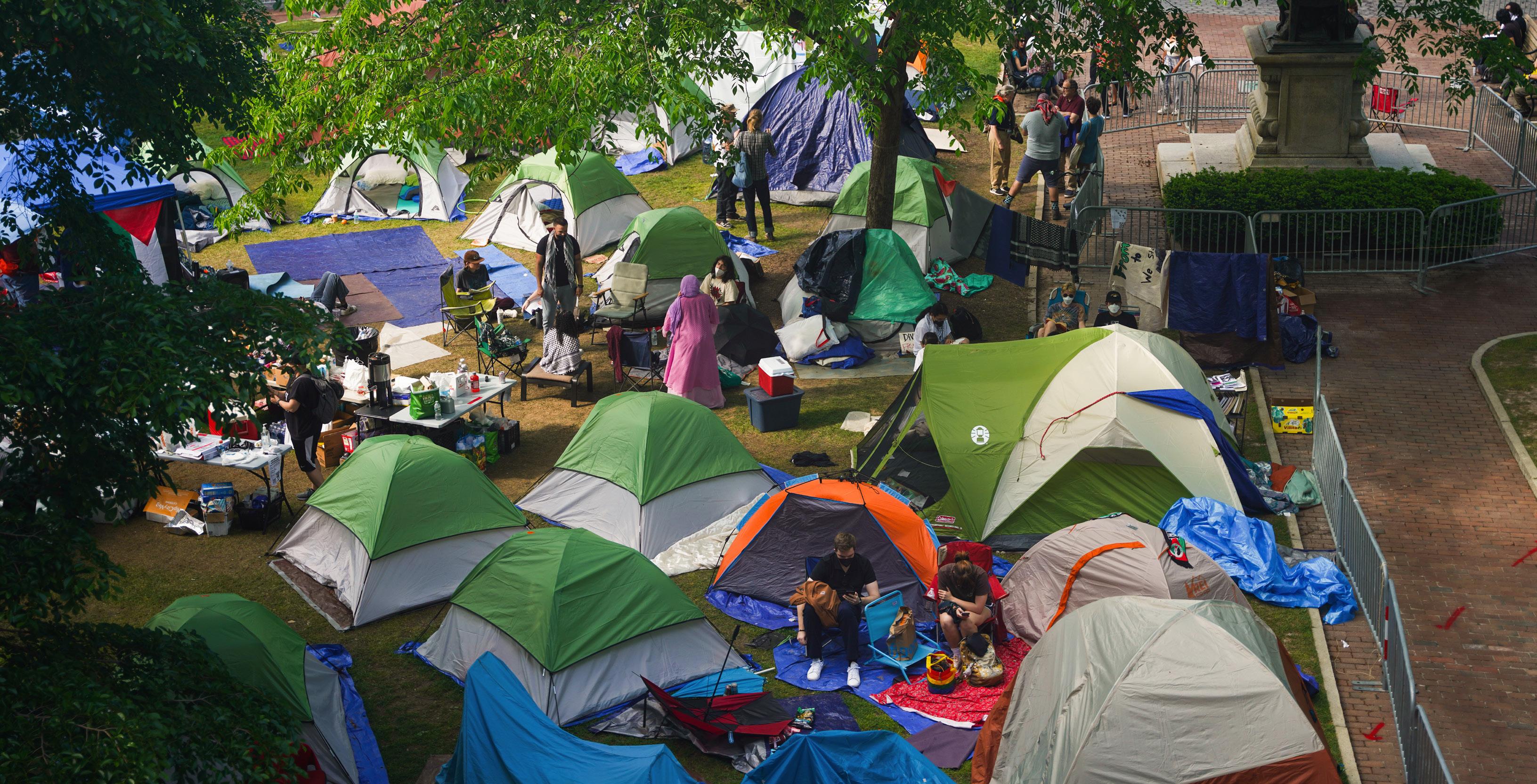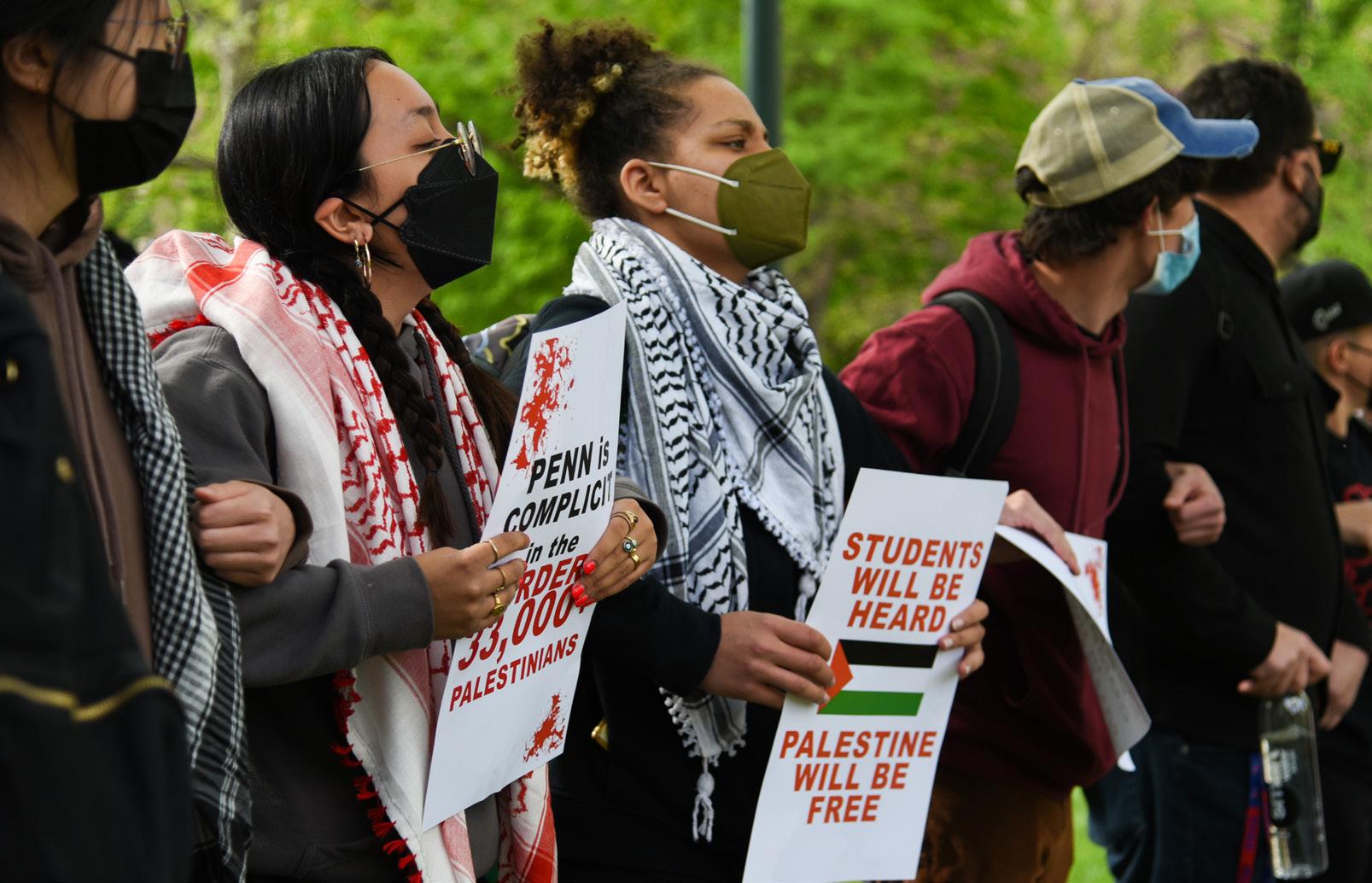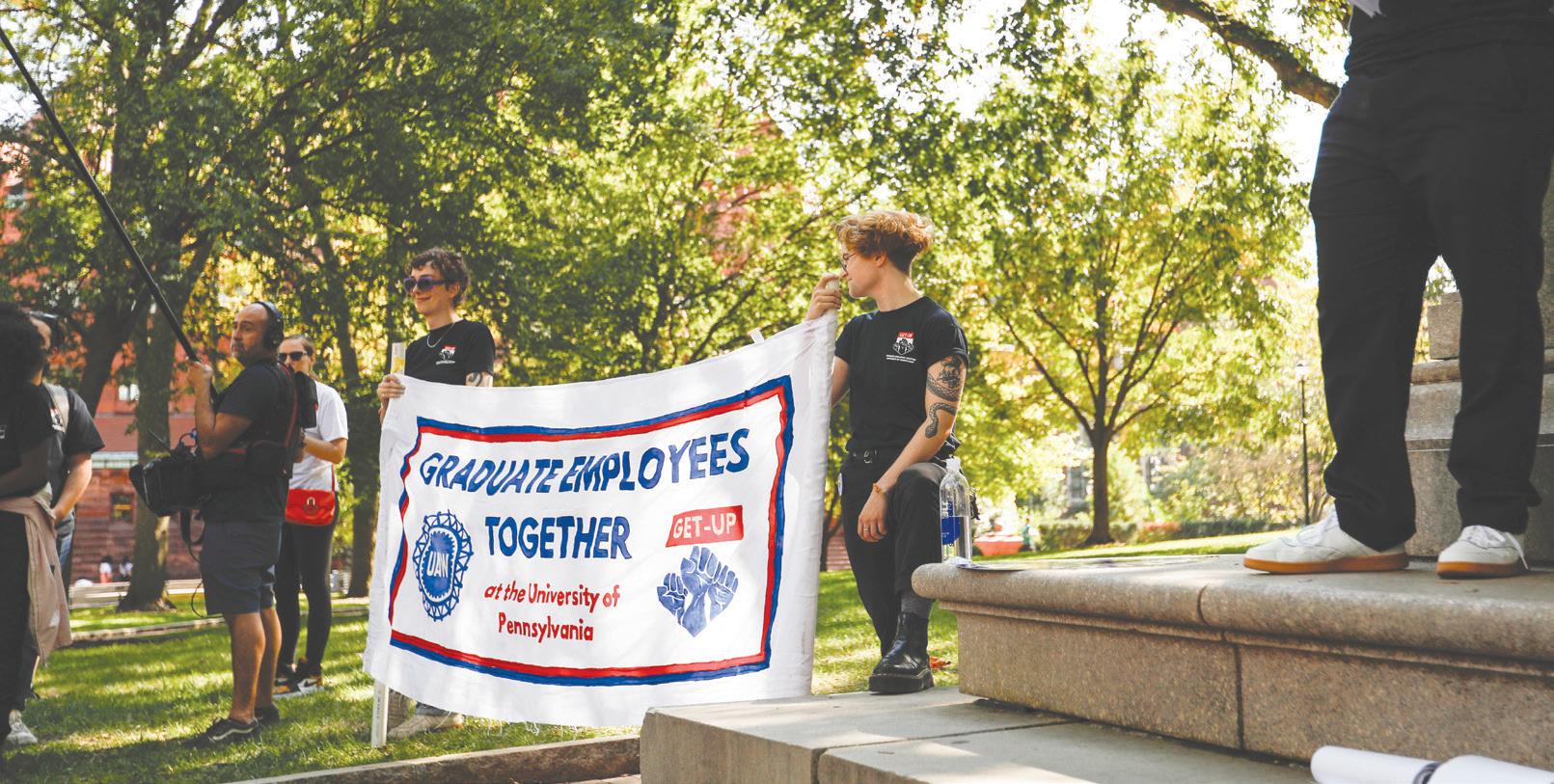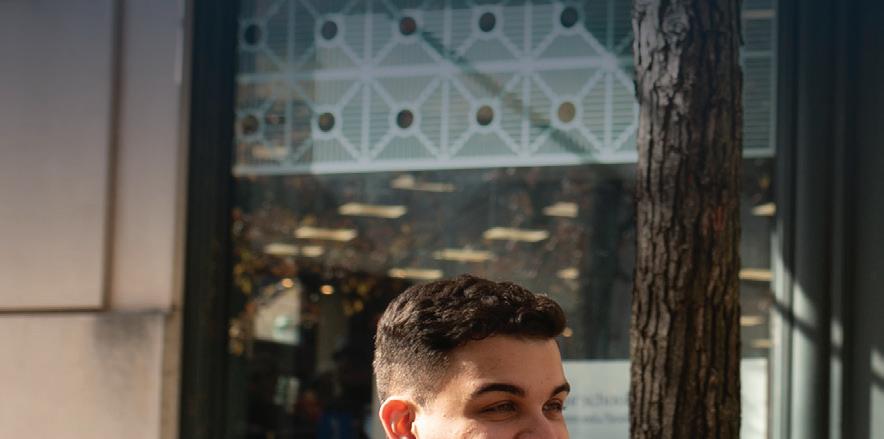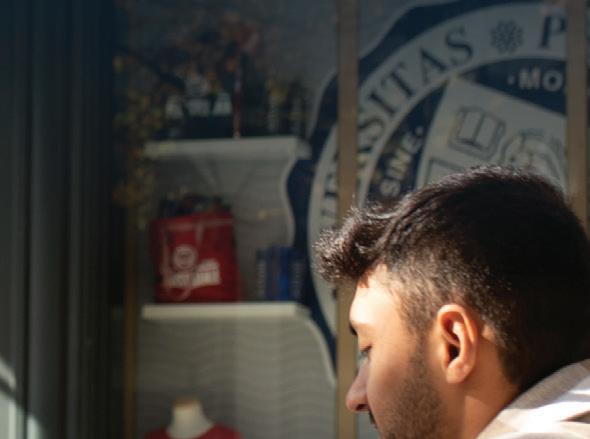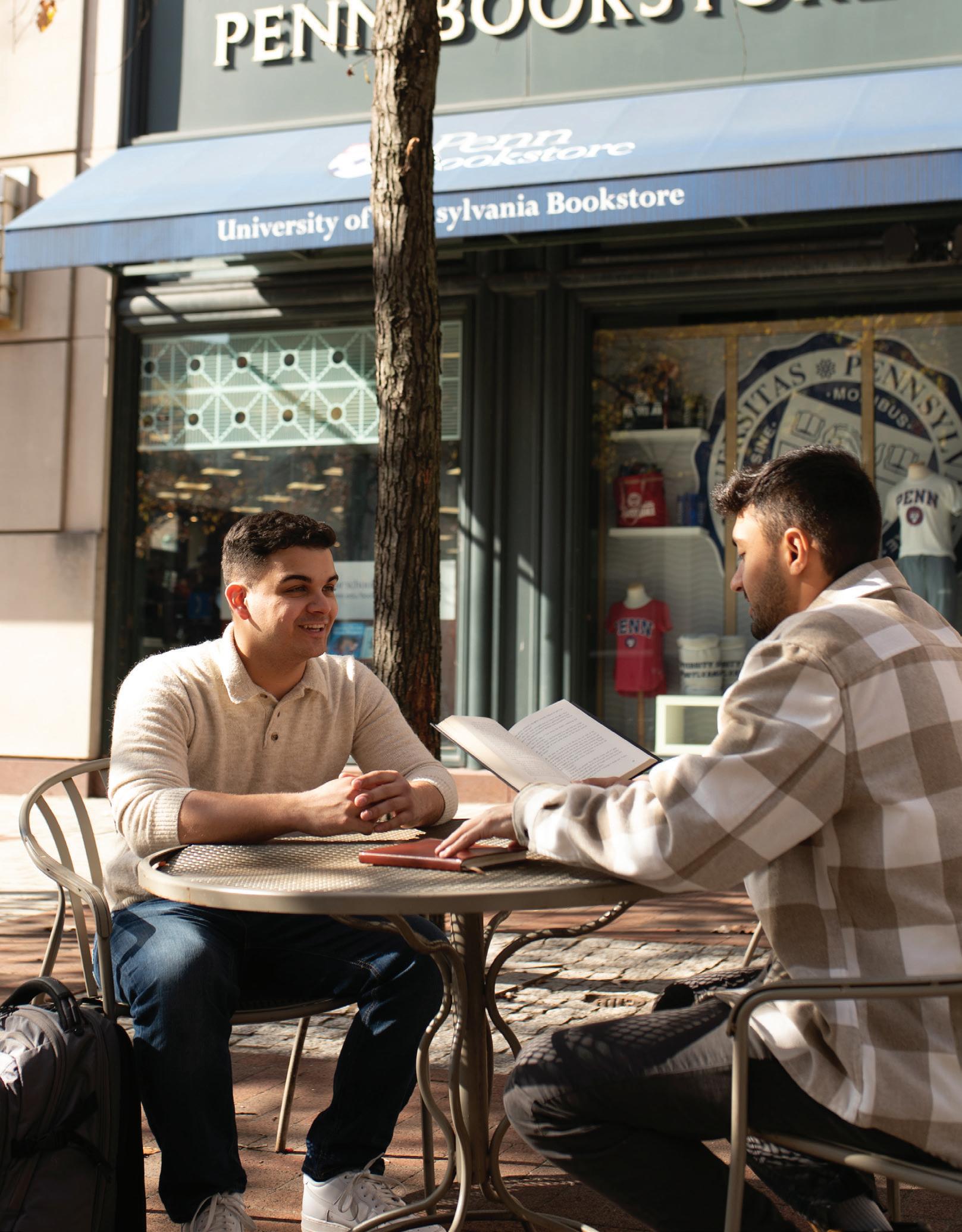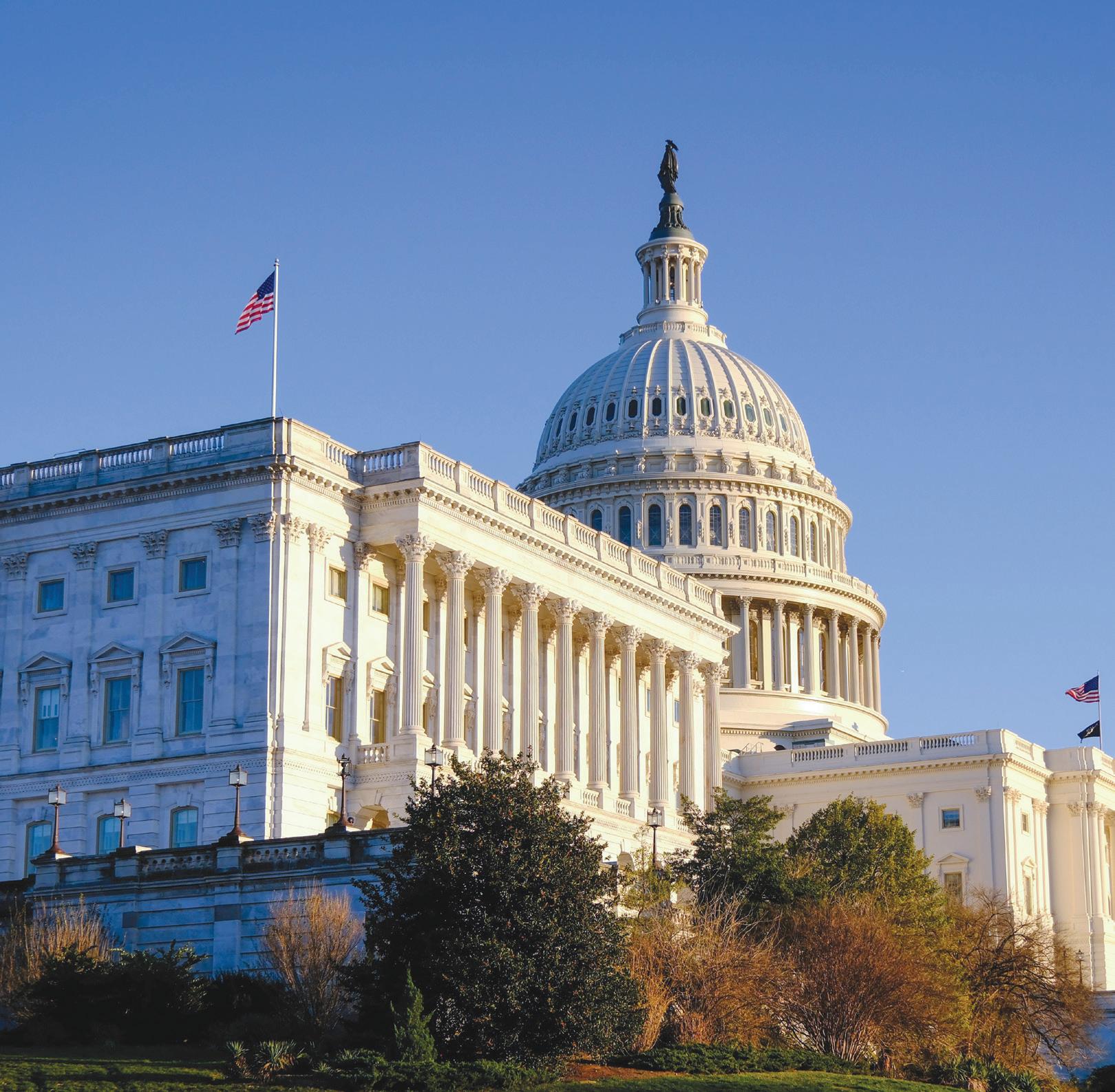Peaceful protest belongs on college campuses
All over the country, student-led encampments for Gaza have popped up in recent days. The encampment at Penn was erected on Thursday following continued action at Columbia University, and since then, we have only seen the national movement continue to grow. This is a developing situation, and as of my writing this, there are over 50 encampments on campuses nationwide.
Penn is no stranger to being in the spotlight of the Israel-Palestine conflict’s impact on elite college campuses. Back in September, the Palestine Writes Literature Festival brought a whirlwind of criticism to Penn’s door, and former President Liz Magill’s response and actions thereafter led to her resignation.
As documented throughout history, protests and sit-ins have been utilized as a positive tool for change. At Penn, we are now seeing hundreds of organizers and approximately 40 tents lining College Green. I support students’ rights to peaceful protest, as it is a cornerstone of our democracy. We’ve seen many examples of times when student protest at Penn brought forth the changes demanded. The 1969 College Hall sit-in against the displacement of West Philadelphia residents by the University is a prime example highlighted on Penn’s website. Currently, Penn graduate students are pushing to unionize and holding rallies to advance their objectives. An election that was originally scheduled for mid-April has been moved to May as students actively organize around the cause.
This long history of student activism will continue with the current encampment involving Drexel and Temple students, as well as activists and community members from the greater Philadelphia area.
Free speech should be protected, but unfortunately, these peaceful demonstrations can still be met with violence. I’m well aware of how common police brutality and the use of excess force are, but videos of students in prayer being apprehended, students being tased when fully restrained, and professors being arrested have shocked members of society who believe said
actions no longer occur. We exist in a world that is very much unjust, and I refuse to turn a blind eye. We need better education surrounding the true protections of free speech and said limitations — hate speech is not, and should not be, protected. On the other hand, peaceful demonstrations should always be upheld. Without them, we lose one of the greatest tools for change we are given that is accessible to all. They’re enshrined in the First Amendment for a reason, and our founding fathers — as do I — see free speech, press, and assembly as one of the best foundations we have.
These encampments are impossible to ignore, and that is one of the reasons they are being utilized. Students are so moved and agitated that the threat of arrest — especially in the case of entirely peaceful demonstrations — doesn’t subdue them: it inspires them to hold their ground.
On Friday, Interim President Larry Jameson made a statement calling for the disbandment of the camps. I don’t see forcibly shutting down these camps as a viable solution towards long or short-term peace within the higher education system. The Israel-Palestine conflict has been ongoing for more than 100 years, and while I hope a solution can be reached in the future, that will not happen overnight. What can happen on university campuses like Penn is the demands of the protestors — most notably the release of Penn’s financial holdings and defense of proPalestinian students involved in protest — being thoughtfully considered and discussed by administration.
I urge people who disagree with the encampments to ask themselves what they would do if they witnessed a community they felt a personal connection to, or stood in solidarity with, being killed at drastically high numbers. The scholasticide of Palestinian scholars and mass killing of children — all partially funded by the United States government — present incredible injustices that we are witnessing in real time. Penn does not stand alone, nor do any of
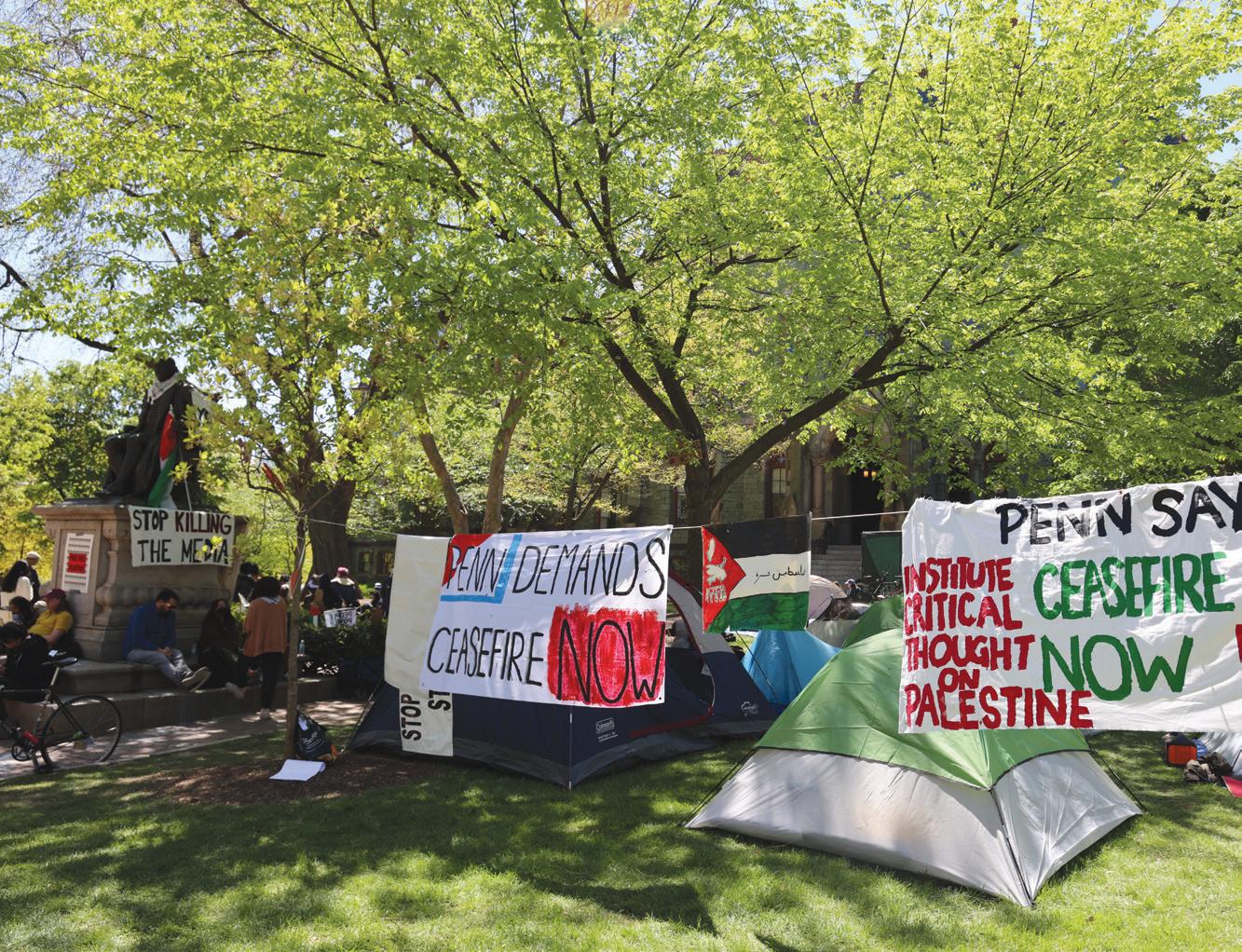
these universities and their students. A sole encampment may be seen as a nuisance or waste of time, but together, across the country, these students stand in solidarity with each other and with Gaza.
When walking through the Penn encampment today, I witnessed people coming together to share poetry, engage in prayer, and provide resources and support to one another. More spaces of presumed support — endorsed by the University — would be helpful in allowing people to feel heard, seen, and valued without the need to occupy College Green.
I also urge people to remember that these encampments are not isolated to Penn or even to Ivy League schools. At our close neighbor Swarthmore, and in my own home state of Arizona, at Arizona State University, students are participating in these protests. All across the
A place on campus to ask questions
country, students are moved to take action.
I support Jameson and his statements regarding the safety and importance of cross-cultural communication and listening, and I urge Penn community members to do the same. That being said, Penn administration can call for the disbanding of the encampment and urge students to go home. But until they quell students’ desires for administrative accountability and provide spaces for Palestinian culture to be fully recognized, students’ right to exercise their voices in a peaceful manner seems like it will prevail.
MIA VESELY is a College sophomore studying philosophy, politics, and economics from Phoenix, A.Z. Her email is mvesely@sas.upenn.edu.
GUEST COLUMN | Cultivating common ground through discussion and shared experience is daunting and necessary
As a precaution for potentially miscalculating the true first night of Passover, it is traditional to hold a seder two nights in a row when outside the land of Israel.
I celebrated the Passover Seder three times this year.
This semester, I participated in a Jewish and Muslim discussion group: one of many campus initiatives fostering student dialogue about the current war in Gaza. We initially planned to attend both a communal iftar and a seder together, but were not all on campus on the first or second night of Passover, when sedarim are traditionally held. No problem. With 40-plus Passover Sedarim under my belt, I offered to host one myself. We decided to meet on Sunday night before the holiday officially began.
The night before our seder convened, I stayed up until 4 a.m. watching footage of the protests at Columbia University. I felt numb seeing many nonviolent protesters (many of whom were Jewish) get hauled away by the
police and felt terror watching videos of explicitly antisemitic threats and slurs being chanted and specifically directed at Jewish students, many of whom I knew personally. I felt conflicted about the public statements condemning the protests and repulsed that speaking up against antisemitism had become politicized. I wished that condemning antisemitism and protecting free speech at the same time could be a politically viable opinion in 2024. I felt bewildered by how politicians who once aligned themselves with Nazi sympathizers could be lauded as protectors of the Jewish people. I felt confused as to why defenders of equality and civil rights could not speak out against a minority of protesters espousing hate.
I felt guilty that my next thought was apprehension of when this unrest would inevitably reach Penn. I was dreading our conversation at the seder the next day. I did not feel confident having such an emotionally fraught conversation with people I was not sure

with whom I would agree. But I showed up anyway.
The seder began light heartedly. We recited blessings over grape juice and held our noses for bites of charoset, matzo, and horseradish. We compared the Passover tradition of hiding and collecting ransom for a piece of matzo with the Desi tradition of stealing a groom’s shoes at a wedding. I learned that Moses and the Exodus story are largely included in the Quran.
I soon felt comfortable sharing my complicated reactions to the protests at Columbia. I realized that videos of antisemitic threats don’t travel very far out of the Jewish media sphere and how that not knowing reinforces the suspicion of politicians denouncing protests as antisemitic. I affirmed my deep humanitarian concerns about the crisis in Gaza, and the cycles of violence that have led us to this point, as well as my conviction for free speech and nonviolent protest. I expressed frustration with how police presence escalates protests and wondered how we could guarantee safety for all students by other means.
I did not, however, have to explain the primal concern for the wellbeing of my community that underscores my years-long political investment in the conflict. Or how that sense of community transcends time and place because of rituals like the seder and its text, the Haggadah. I also did not have to explain why so many people who I love call Israel their home and the centrality of that place in Jewish liturgy and religious tradition. Everyone at my seder could see and read that for themselves.
I also did not have to restate my commitment to dialogue and understanding or my belief that the safety of all people in the land is intrinsically connected. My presence in the room and every conversation before it made that clear.
The most immediately practical takeaway from my seder was realizing the extent to which all parties in this campus conflict consume radically different news. Our
Speak to protesters’ first demand
Young people across the country are demanding that their universities disclose and divest. At Penn, student protesters want to see the University be transparent about how the endowment is invested. They want to distance our institution from the profits that some corporations are extracting from a horrendous war. Student demands should not be put aside. Such demands build not only on previous divestment campaigns but on a history of struggles to make ethical choices — as individuals, as communities, as institutions — about what our resources support.
perceptions of the protests at Columbia, and the war in Gaza, are filtered through the lens of X’s algorithm and our community affiliations. Confronting and supplementing those differences is critical for promoting honesty and accountability in discourse.
Alongside uncovering misconceptions, my seder assured me of how much my peers value the theoretical and communal contours of my personal beliefs. They understood the part that I can never put into words because they took the time to immerse themselves in it directly. We have taken the time to do that for each other this semester. These shared experiences and honest conversations have a double effect of promoting direct understanding and building up enough trust on the basis of each other’s opinions to support enduring disagreement.
There is no future for dialogue on campus that is separate from a present reality that we are willing to manifest. We find our common ground by cultivating it and asking good questions about what the other side really believes and why. To get in the room, we must confront our worst expectations of those whose opinions and backgrounds we assume and have not asked about.
We have two sedarim because we cannot be sure when the true first night of Passover falls. Out of an abundance of caution for potential miscalculation, the Jewish tradition explores each of the Hagaddah’s myriad philosophical and religious inquiries twice in a row and still finds new things to discuss. To be on the safe side, put yourself in a place to ask questions again and again. There is no limit to the discovery that can take place, especially when you think you have already heard the answers.
MADELINE KOHN is a College sophomore studying urban studies from Lower Merion, Pa. Her email address is kohnm@sas.upenn.edu.
COLUMN | History offers examples relevant to our current conversations ANN FARNSWORTH -ALVEAR is an associate professor of history, KATHLEEN M. BROWN is a David Boies Professor of History, ROQUINALDO FERREIRA is a Henry Charles Lea Professor of History, WILLIAM STURKEY is an associate professor of history.
It is possible to imagine a world in which the endowments of educational and medical
institutions are understood to be different from other pots of money, and are invested only where there is broad agreement that no public harm is being caused. We don’t have to look far for models of past efforts to find an ethical financial path. Philadelphia supplies examples of the struggle to make ethical choices with money: Many Quakers refused to support war. Eventually, this led to their condemnation of slavery. Philadelphia was the epicenter of an ethical community, where abolitionists committed to “free labor produce” chose not to purchase slave-produced sugar because it meant providing financial support to Caribbean enslavers. Abolitionists who were vilified in their own times seem visionary
in ours. Angelina Grimké, the daughter of a South Carolina enslaver turned Quaker abolitionist, scandalized Philadelphia in 1838 when she used her own wedding as a way to distance herself from sugar, cotton, and coffee: products produced by a brutal slave system.
For an enslaved person, choosing the dangerous path of “self-theft” — a choice of freedom — was illegal. Thousands of enslaved people put their bodies at risk to cross into Pennsylvania from Maryland, Delaware, and Virginia. Labeled fugitives then, we see them as heroes now. Times change. The conversations we need to have now require transparency about the endowment. They may also require discussion about the way
investments in private equity funds make such transparency difficult. We support students’ insistence that Penn provides an honest accounting of how the endowment is invested. We want to hear what students have to say about divestment.
4 THURSDAY, MAY 2, 2024 | THEDP.COM THE DAILY PENNSYLVANIAN OPINION The Land on which the office of The Daily Pennsylvanian stands is a part of the homeland and territory of the LenniLenape people, known to the original Indigenous people as “Lenapehoking.” We affirm Indigenous sovereignty and will work to hold The Daily Pennsylvanian and the University of Pennsylvania more accountable to the needs of Native American and Indigenous people. LAND ACKNOWLEDGEMENT INSIA HAQUE Deputy Design Editor KATRINA ITONA Deputy Design Editor ANISH GARIMIDI Deputy Design Editor EMMI WU Deputy Design Editor ASHA CHAWLA Design Associate GARV MEHDIRATTA Crossword Editor CHENYAO LIU News Photo Editor SYDNEY CURRAN Opinion Photo Editor WEINING DING Sports Photo Editor JACK LAKIS Summer Opinion Editor MOLLY COHEN President ANNA VAZHAEPARAMBIL Executive Editor JARED MITOVICH DP Editor-in-Chief SOPHIA LIU Design Editor WEI-AN JIN Design Editor CHARLOTTE BOTT Copy Editor LAURA SHIN Copy Editor KATIE BARTLETT News Editor BEN BINDAY News Editor ELLA SOHN Assignments Editor YOMI ABDI Opinion Editor WALKER CARNATHAN Sports Editor VIVIAN YAO Sports Editor ABHIRAM JUVVADI Photo Editor LIV YUN Podcast Editor DEREK WONG Video Editor JADA EIBLE HARGRO Social Media Editor SARAH MARCUS Diversity, Inclusion, & Standards Director ZAIN QURESHI Business Manager EDWARD LIU Analytics Manager SANGEETA QUDDUS Finance & Accounting Manager DHRUV GUPTA Innovation Lab Manager IRENE PARK Strategy & Promotions Manager 140th Year of Publication Have your own opinion? Send your letter to the editor or guest column to letters@thedp.com. Editorials represent the majority view of members of The Daily Pennsylvanian, Inc. Editorial Board, which meets regularly to discuss issues relevant to Penn’s campus. Participants in these meetings are not involved in the reporting of articles on related topics. LETTER SUBMISSION THIS ISSUE’S TEAM THIS YEAR’S BOARD Opinion
VESELY’S VISION | The student encampments around the country are powerful tools for change
JEAN PARK | SENIOR PHOTOGRAPHER
Columnist Mia Vesely argues for the protection of college students’ right to free speech.
SYDNEY CURRAN | SENIOR PHOTOGRAPHER
The Jewish holiday of Passover started at nightfall on April 22.
GUEST

It’s comforting to imagine ourselves as heroes in the records of history, standing on the “right side” of moral battles. Many of us believe that, if given the chance, we would have marched during the Civil Rights Movement, rallied against apartheid, or fought for suffrage. Yet, in the routine of our daily lives amidst contemporary injustices, one must ponder — would we really be any different?
Our education often champions a teleological narrative of history in which we’re steadily progressing towards a better, more enlightened era. It’s a comforting thought, like a gentle pat on the back, telling us to relax because things are on the right track.
But this notion is seriously flawed.
The same structures that enabled horrific atrocities in the past are still around, just dressed up in modern clothes. For instance, recent critiques by UN experts highlight how systemic racism within United States police and courts is not just lingering prejudice but an evolution of past injustices, deeply rooted in the era of slavery and Jim Crow laws.
Globally speaking, our international track record — from failures to intervene in the Holocaust to more recent crises in Sudan’s Forgotten War, Myanmar’s ongoing Rohingya Genocide, or Australia’s controversial refugee detainment camps — shows a disturbing pattern. The pledge of “never again” seems to have quietly turned into “again and again” as the international community repeatedly fails to act decisively.
More pressingly, teleological storytelling risks misleading us into believing that the unfolding of human affairs is entirely preordained and inevitable. In reality, history is the slow accumulation of individual choices and actions. When we buy into the myth of inevitability, we risk absolving ourselves of the active role we must play in shaping our future.
The hesitancy to dive into the waters of activism is hardly a novel sentiment. After all, if the fires aren’t from our own backyards, we feel less urgency to douse them. This psychological and social distance tends to mute our rallying cries. However,
activism that demands we alter our own beliefs or lifestyles isn’t just uncomfortable — sometimes it seems downright impossible.
Psychologist Paul Slovic has given a name to this overwhelm: “psychic numbing.” This phenomenon describes how our empathy wanes as the number of victims in a tragedy swells. A sense of inefficacy tricks us into thinking our acts of kindness are drops in an ocean too vast to ever fill. It’s a cruel irony of human psychology: the more widespread the suffering, the less potent our individual efforts seem, and the weaker our impulse to help becomes.
Perhaps even more alarmingly, there is an increasing fear of social or professional repercussions that significantly stifles our voices. It is deeply troubling to observe how pro-Palestinian students and professors across U.S. college campuses have to balance their advocacy with the looming threat of jeopardizing future career prospects. Consider Asna Tabassum, the University of Southern California’s class of 2024 valedictorian, who was barred from speaking at graduation
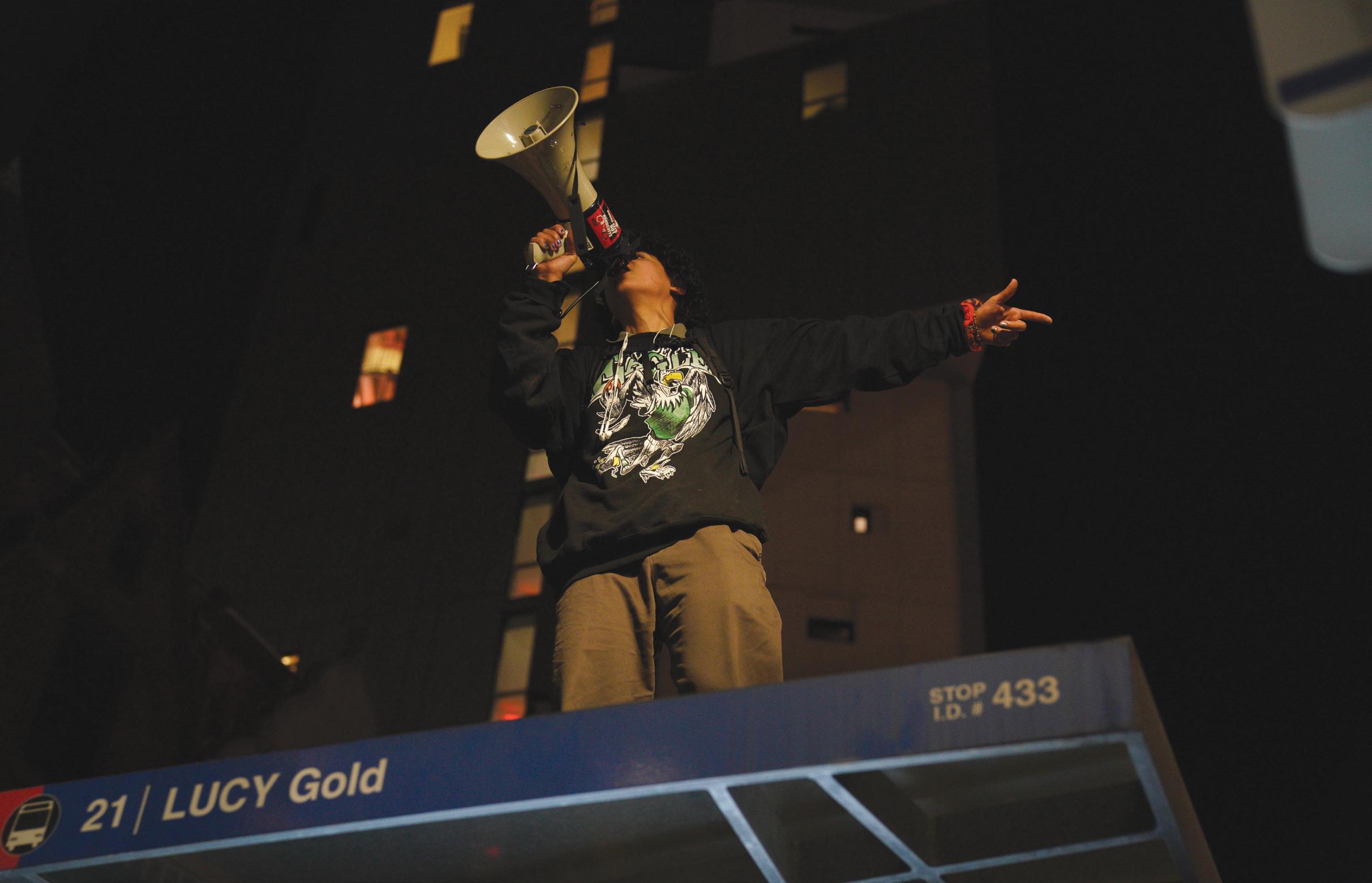
because of a hate campaign in response to her pro-Palestinian stance. Adding to these concerns, more than 100 protesters were arrested at Columbia University last week. Even here at Penn, the University banned the activities of Penn Students Against the Occupation of Palestine and condoned police detainment of students for chalking “Let Gaza live” across Locust Walk.
This effect on student activism reveals a chilling crack in the foundation of our professed freedoms. If the cost of speaking out is the forfeiture of future opportunities, then surely, we must question the integrity of our societal structures that respond with censorship. Are we fostering a culture where advocacy is only for those who can afford to be fearless, or worse, excludes certain people altogether?
We must acknowledge that inaction is a privilege fraught with profound consequences. The Milgram experiment from the 1960s illustrates this point. Designed to probe the psychology of genocide, the study revealed how ordinary people could be driven to commit horrifying acts by obeying authority. This demonstration of compliance underscores a broader truth: when we opt to stand by, whether due to psychic numbing, perceived inefficacy, or fear of repercussions, we risk becoming unwitting accomplices in perpetuating harm, echoing the dark chapters of history we so readily condemn.
Despite formidable barriers, there are uplifting instances of people surmounting these obstacles to drive meaningful change. The advent of social media has been particularly transformative, amplifying previously marginalized voices and their reach around the world. For instance, the Iran protests which began in September 2022 saw thousands, led predominantly by young women, take to the streets and social media to demand reform following the death of Mahsa Amini in police custody. Similarly, Russia’s invasion of Ukraine in February 2022 led to worldwide antiwar protests while the global climate protests in September 2023 marked one of the largest coordinated actions post-COVID-19 for climate advocacy.
Together, these movements reflect a global trend towards challenging the status quo and advocating for far-reaching societal changes.
As we contemplate our hypothetical heroism in past conflicts, it is crucial to scrutinize our current actions. Claiming potential activism in the past is easy self-assurance; the real test of our character is reflected in how we address today’s injustices. Otherwise, perhaps our imagined historical heroism is just that — an imagination.
LALA MUSTAFA is a College sophomore studying international relations and history from Baku, Azerbaijan. Her email address is lmustafa@sas.upenn.edu.

O ering 60+ eateries, stores, and entertainment venues, the Shop Penn
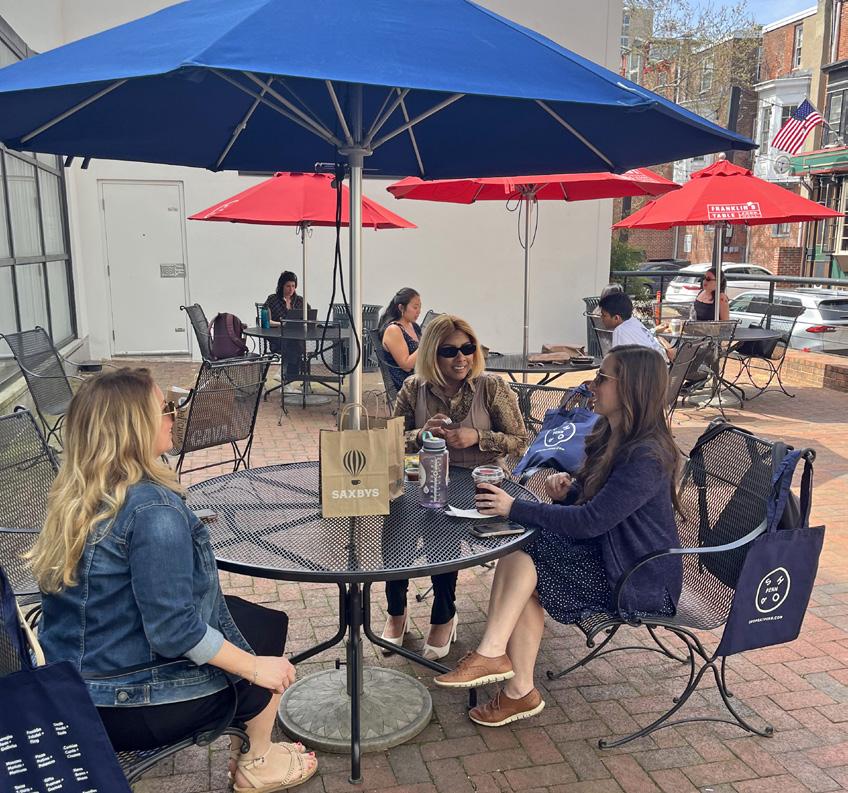


5 THURSDAY, MAY 2, 2024 THEDP.COM | THE DAILY PENNSYLVANIAN OPINION
Shop Local. Shop Penn. #SHOPPENN @SHOPSATPENN
Calling all Movers Shakers + Quakers
plenty of ways to fuel up for finals. Foodies Deliveries + Shopping Sprees
Retail District provides
We’re all talk, no action MUSTAFA’S MUSINGS | A critical look at our approach to modern crises
ANNA VAZHAEPARAMBIL | SENIOR PHOTOGRAPHER
Columnist Lala Mustafa encourages students to turn their desire for change into tangible action.






























6 NEWS THURSDAY, MAY 2, 2024 | THEDP.COM THE DAILY PENNSYLVANIAN University of Pennsylvania students: Save an extra 5% every day.*** SIGN UP 1. Join ACME for U®. 2. Verify your student status. 3. Save more with exclusive deals, rewards, savings & monthly freebies!*** *For ACME for U® up to 20% weekly savings percentage details and full offer terms and conditions, visit acmemarkets.com/foru. ® ***Subject to program details. Visit acmemarkets.com for full terms and conditions. Join free, get $5 off $25** NEW Enjoy deals, personalized for you Shop to earn Points to redeem on gas & groceries Opt in for automatic cash off groceries Save up to 20% weekly with
ANTISEMITISM, from FRONT PAGE
press conference that the presidents of Yale University, UCLA, and the University of Michigan would testify at a May 23 hearing.
Foxx thanked Johnson for expanding her committee's investigation at the Tuesday press conference.
"As Republican leaders, we have a clear message for mealy-mouthed, spineless college leaders: Congress will not tolerate your dereliction of your duty to your Jewish students," Foxx said. "American universities are officially put on notice that we have come to take our universities back."
Foxx also criticized the ongoing pro-Palestinian encampments at universities across the United States.
"No stone must go unturned while buildings are being unfaced, campus greens are being captured, or
graduations are being ruined," she said. "College is not a park for play-acting juveniles or a battleground for radical activists."
The aide added that, while other House committees will now be analyzing antisemitism on college campuses through their own perspectives, the education committee's investigation will not be altered. They added that the house-wide investigation will now be building on the work already done by their committee.
Johnson spoke of the importance of Jewish student safety on their respective campuses at the press conference.
“We will not allow antisemitism to thrive on campus, and we will hold these universities accountable for their failure to protect Jewish students on campus,” he said.
The House-wide investigation comes as the Gaza Solidarity Encampment on Penn's College Green enters its seventh day. Throughout the week, counterprotests and reports of antisemitism have occurred at the encampment.
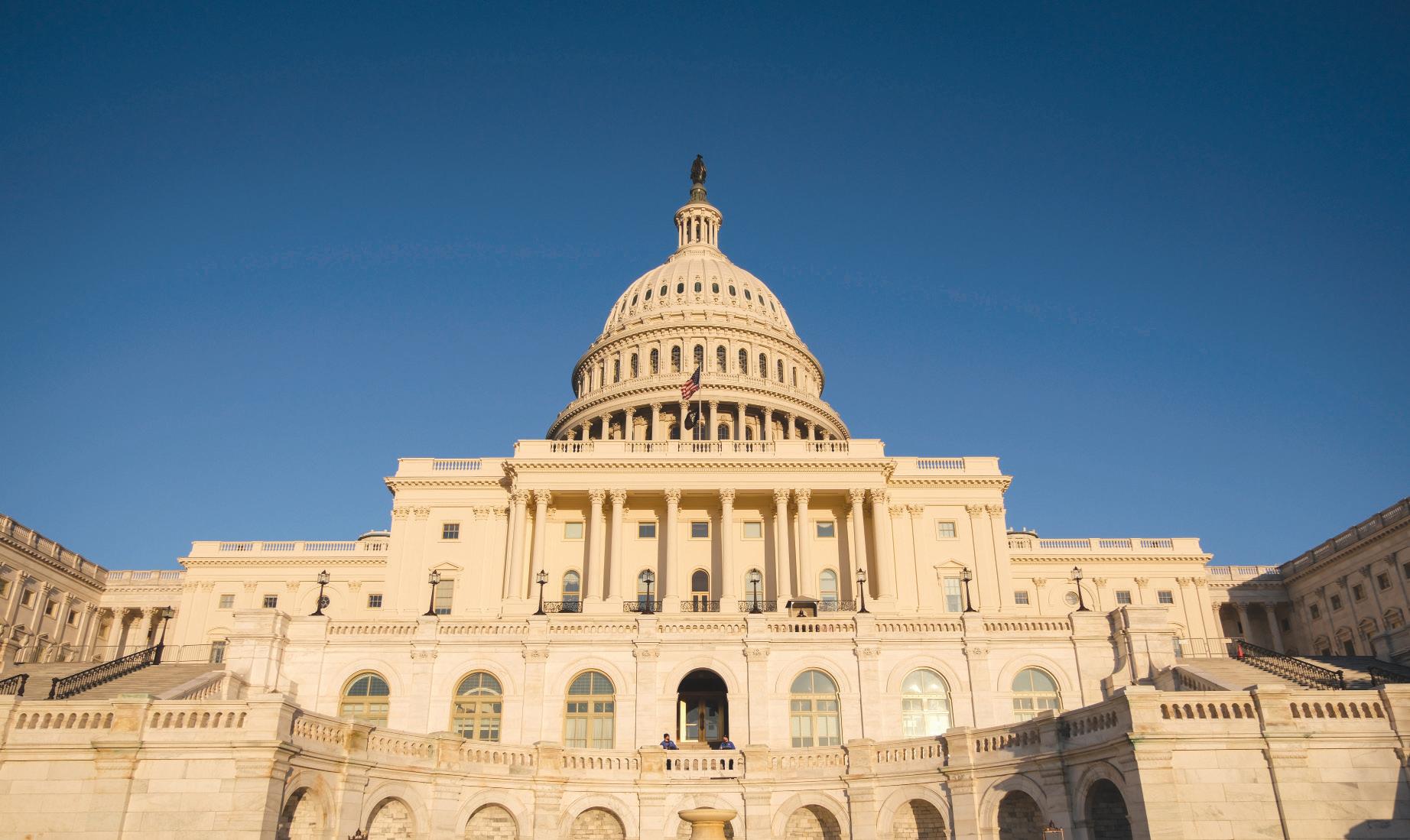
REFERENDUM, from FRONT PAGE
"This ballot is an ideal platform to uplift student voices while combating fears of doxxing and supporting student safety on campus," they added.
The petition also asks if the University should disclose all investments held through its endowment fund and if Penn should cut ties with Ghost Robotics, a company housed in Pennovation Works that develops four-legged robots for military use that are allegedly used by the Israeli government to “commit human rights violations.”
The MSA spokesperson also emphasized the importance of student participation in the referendum.
"We want to emphasize that it is crucial that ALL undergraduate students vote on this referendum," they said. "Whether students vote in support or disagreement with the questions, this is an opportunity to receive the most accurate perspectives of the undergraduate student body."
A Penn Arab Student Society spokesperson wrote to the DP that the group "is in full support of MSA’s referendum and wants to echo the MSA’s ask that all undergraduate students exercise their right to vote.”
The petition gathered the 500 signatures necessary to be sent to the undergraduate student body and
came before the Nominations and Elections Committee for approval on Wednesday night.
“We understand that the MSA is proposing an unprecedented referendum and we want to stand by our commitment to amplifying student voices and our responsibility to advocating for the student body,” NEC Chair Yousef Elyoussef and UA President Ria Ellendula wrote in a joint statement to the DP on Wednesday. “Our goal is to ensure this is an equitable and transparent process.”
The Penn Israel Public Affairs Committee posted on its Instagram story after the referendum vote was opened, writing "VOTE NO TO BDS PROPOSAL NOW!!!! SO IMPORTANT THIS DOES NOT PASS."
Earlier in the week, in response to MSA's referendum being proposed, PIPAC sought their own referendum — writing that it was in response to "the proposed BDS referendum that went around campus yesterday."
PIPAC asked four questions related to whether Penn should adhere to the Department of Education and Pennsylvania's anti-discrimination regulations, whether Penn should continue investing in Israeli companies spearheading "cancer research," "medical breakthroughs," and "innovative technologies to assist underdeveloped countries"; and whether the University should maintain ties with Israeli companies working on using technologies to "defend itself and free the hostages."
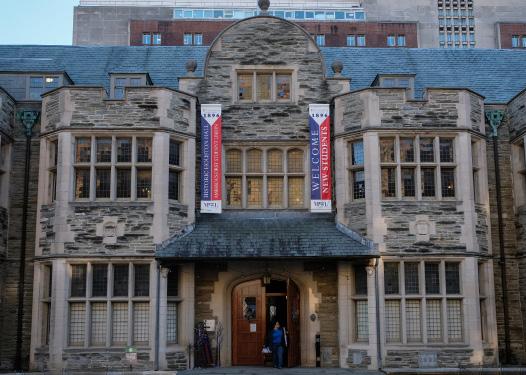
ENCAMPMENT, from FRONT PAGE
speech and the productive exchange of ideas, but we will not allow any actions that harass, threaten, or intimidate others,” Jameson wrote.
On Tuesday, Penn opened disciplinary cases into at least three students participating in the encampment. A University spokesperson wrote in a statement to the DP that Penn has “clearly communicated” that encampment participants “are in violation of the University’s policies.” The University is “checking IDs in accordance with Penn’s Open Expression Guidelines,” according to the statement.
The spokesperson added that “several student disciplinary cases” have been opened through the Center for Community Standards and Accountability, and that faculty and staff violations “will follow the relevant disciplinary processes.”
“These actions, while unfortunate, are necessary,” the spokesperson wrote.
After a meeting with Jameson and Provost John Jackson Jr., PAO issued a statement on Instagram on Wednesday reaffirming protesters' commitment to the encampment. The statement indicated that protesters would not enter into negotiations until Penn met several stipulations, which included withdrawing disciplinary proceedings against students, removing police presence from the encampment, and explaining any potential Guidelines on Open Expression violations before checking IDs.
"While the University drags its feet, we remain steadfast and our demands will not change," PAO wrote. "Until our demands are met, this encampment will not move and neither will the community in it."
Programming focuses on Palestinian cause Protesters have engaged in praying, chalking, chanting, and a wide ranging of programming throughout the past several days.
Frequent chants include "Free, free Palestine," “The students, united, will never be defeated,” and “There is only one solution, intifada revolution.” Some chants relate directly to the University, such as "Disclose, divest, we will not stop we will not rest" and “Liberation is our mission, no more bombs with our tuition."
On Saturday, the National Lawyers Guild led a deescalation training on how to respond to antagonistic behavior and interactions with the police. Fred Hampton Jr. of the Black Panther Party Cubs and former MOVE movement member Pam Africa delivered speeches, as well as several Penn faculty members, including associate professor of English Dagmawi Woubshet and associate professor of Arabic literature Huda Fakhreddine.
Over 200 attendees gathered on College Green for a “Seder in the Streets” on Sunday. The event — cohosted by Jewish Voice for Peace Philadelphia, Rabbis for Ceasefire Philadelphia, Families for Ceasefire Philly, and Tikkun Olam Chavurah — followed the order of a traditional Passover seder but included prayers and chants supporting the people of Gaza.
During the seder, a man with a knife holster and wearing an "I stand with Israel" shirt entered the event and was followed by multiple police officers and legal observers. Two knives were seized by police, who said that he “violated civil code” and would be receiving a citation. The man was escorted away from the seder and was seen entering a police vehicle in hand cuffs.
The Gaza Solidarity Encampment addressed the incident in a statement later that day, contending that "the administration’s concern is one-sided and it is ambivalent when violence is directed towards us.”
“Even when a Zionist screams hate speech and carries multiple weapons, putting families with young children in explicit danger, supporters of our encampment are still the ones associated with violence,” the statement wrote.
The statement also contended that Penn administration attempted to stop the "Seder on the Streets" event before it started by telling organizers not to use the lawn next to the encampment.
Several politicians have visited the encampment to show solidarity with peaceful student demonstrations, including 2013 Engineering graduate and Pennsylvania state Rep. Rick Krajewski, state Sen. Nikil Saval (DPhiladelphia), and City Councilmember Jamie Gauthier.
Activism continues against encampment
The encampment has prompted increased pro-Israel activism on campus, with some expressing safety
concerns for Jewish students and calling on Penn to take disciplinary action against the protesters.
On Monday, around 250 community members gathered on Annenberg Plaza for a pro-Israeli rally entitled “No Hate on Campus." The program featured speeches from Jewish community members and Anti-Defamation League Regional Director Andrew Goretsky, and attendees sang American and Israeli national anthems.
Community members gathered on the plaza with Israeli flags and signs reading “No Hamas No KKK, fight racism and antisemitism,” “UPenn stands with Israel and the United States,” and “Protect Jewish students.”
“I am proudly and unapologetically a Jew,” Penn Medicine professor Benjamin Abella told the crowd. He said that he believed that everyone in attendance loved America, Penn, and “accept[s] and encourage[s] robust discussion and debate.”
Wharton and Engineering junior Noah Rubin, who also spoke at the rally, told the DP that he felt the emails and messages sent out by University administration had not actually led to protections for Jewish students.
“We’ve seen a complete lack of leadership and ability to follow through with President Magill and now with President Jameson. There’s a pattern of sending out emails and then not doing anything,” he said. “I need Jewish students to be safe on campus.”
College senior Eyal Yakoby was the last to speak at the rally, encouraging “solidarity” among attendees and denouncing the Penn administration’s lack of action in response to the encampment.
Following the speeches and music, hundreds of rallygoers marched to College Green, where they faced off against encampment participants. The pro-Palestinian and pro-Israeli contingencies engaged in chants from opposite sides of Locust Walk. Officers from the Division of Public Safety added additional barricades outside Van Pelt-Dietrich Library to separate the two groups.
Throughout the time the dueling protests were assembled, chants included “Free, free Palestine” from the pro-Palestinian encampment and “Rape is not resistance” from the pro-Israeli side.
On the encampment's second day, several Jewish community members who spoke with the DP expressed opposition to the encampment, citing allegedly antisemitic actions and behaviors.
Encampment raises stakes of free speech, open expression debates
The presence of the pro-Palestinian encampment has generated significant debate over the right to peaceful protest and Penn's open expression policies.
On Monday, Committee on Open Expression Chair Lisa Bellini shared “anticipatory guidance” for demonstrations with The Daily Pennsylvanian — guidance which she said was provided to Jameson and Provost John Jackson Jr. on April 26.
The document discusses the possibility of asking for Penn IDs in University locations "in some circumstances related to safety and its enforcement authority."
"Free expression rights on campus may be restricted to those with Penn IDs, with appropriate notice provided to the Committee on Open Expression," the document says. "Non-university affiliated persons may have less expansive rights of open expression in University locations than those who are members of the Penn community."
According to the document, checking Penn IDs for safety concerns "ordinarily" does not include making a record of the information for disciplinary purposes. It adds that officials who request identification for "purposes of a possible disciplinary action" must give notice of doing so at the time of the request.
In a Tuesday letter, the Penn chapter of the American Association of University Professors alleged that administrators have “repress[ed]” nonviolent protest" and violated the University's open expression guidelines over the past several days.
In the letter — which was sent to Jameson, Jackson, Vice Provost for University Life Karu Kozuma, the Faculty Senate tri-chairs, and the COE chair — the AAUP-Penn Executive Committee outlined several alleged “abuses” of Penn’s open expression guidelines and called for a new system to “interpret and enforce" the guidelines.
The committee also criticized the University's "acts of intimidation" as potential precursors to a police response or other incitement, claiming that the administration and COE's "fabrications, misrepresentations, and threats … are acts of escalation that are creating fear on our campus."
The statement also criticized the “exclusive power” the vice provost for University life has “to decide when the guidelines have been violated.”
According to the anticipatory guidance, the vice provost or delegate shall determine the extent to which open expression policies apply to non-University individuals.












7 NEWS THURSDAY, MAY 2, 2024 THEDP.COM | THE DAILY PENNSYLVANIAN Complete the grid so each row, column and 3-by-3 box (in bold borders) contains every digit 1 to 9. Skill Level: Solution to Previous Puzzle: SUDOKUPUZZLE Check out page 8 for answers to today’s puzzles!
AMANDA SHEN | DP FILE PHOTO
Penn’s Muslim Student Association’s referendum voting deadline has been pushed back to May 3.
ABHIRAM JUVVADI | PHOTO EDITOR
The House Committee on Education and the Workforce’s investigation into antisemitism on college and university campuses expanded into a House-wide probe.

Women’s Athlete of the Year: Isabella Whittaker
The
Olympic Trials later this year
CONOR SMITH Sports Associate
Wearing the Red and Blue stripes for the last time, senior sprinter Isabella Whittaker never lost speed in her final dash to the finish line. Her dominant senior campaign made her the clear leader of the pack for Women’s Athlete of the Year honors.
Whittaker’s 2024 started off hot. In the span of two January weekends, Whittaker set Ivy league records in the 400 and 500-meter races respectively. For Whittaker, however, this record-shattering start did not come out of thin air. Breaking records was all a part of Whittaker’s plan for her final go-around as a Quaker.
“Leading up to the season, I had written down a bunch of goals for myself,” Whittaker told The Daily Pennsylvanian in January. “Ivy League and school records were on there.”
Just as she planned, Whittaker kept on winning as the season progressed. At the John Thomas Terrier Classic, Whittaker ended her historic January in style, running a 51.96 second 400-meter race. This staggering personal record broke the facility record for the event and was the No. 2 time in the world at the time of the race.
among the sprinters of the Ancient Eight in the 400m sprint. This first-place finish helped catapult Penn women’s track and field to the overall Ivy championship. These commanding performances landed Whittaker a spot in the 2024 Indoor NCAA Championships. Unfortunately, Whittaker was unable to compete in her qualified events due to injury.
Most recently, Whittaker competed during day three of the Penn Relays Carnival, a competition she has run in since her freshman year of high school. This year, she anchored the 4x400-meter sprint and led the Quakers to a third place finish in the event and another Ivy league record.
Whittaker will be continuing her athletic career as a graduate student at the University of Arkansas. She is joining an impressive group of 400m sprinters at a wellestablished women’s track and field program.
“My end goal is to go pro. [Competing at Arkansas] just felt like the perfect next step. It’s going to be pretty intense, but I’m really excited for that,” Whittaker told the DP last week. “I think just switching it up and just trying to see how far I can take this track thing.”
Penn swimming and diving junior breaststroker Matt Fallon’s years of hard work have culminated in one of the greatest seasons in Penn history, and it’s not over yet.
The Warren, N.J. native came into the 2023-24 swim season with momentum from a bronze medal-winning performance at the World Championships last summer, and he kept this momentum going into the collegiate season. Fallon went undefeated in both breaststroke events during the regular dual meet season and was instrumental in Penn’s historic win over Harvard — the first win over the Crimson since 1971.
During the collegiate championship season, all eyes were on Fallon, and he consistently delivered. At Ivies, Fallon touched the wall in a time of 1:49.75 seconds, claiming both a championship title and the fastest time in the NCAA at the time.
A month later, Fallon made a triumphant return to the NCAA Division I Championships after missing last year’s
due to injury. In a competitive heat including five-time world champion Leon Marchand, Fallon finished second behind Marchand. His time put him up as the secondfastest American in history in the 200-yard breaststroke. Outside of the NCAA, Fallon has consistently proved that he is the top American 200-meter breaststroker and the one to beat at this year’s U.S. Olympic Trials. At the U.S. Open, Fallon took home a win in meet record-breaking-fashion in the 200-meter breaststroke over a field of Olympians and fellow World Championship medalists. Most recently, at the TYR Pro Swim Series, Fallon took home a revenge win over Marchand.
As we head into the final weeks ahead of the U.S. Olympic Trials, Fallon’s chances of an Olympic berth this summer are high. Regardless of his Olympic outcome, the Penn community will be looking forward to next school year for his final season with the Red and Blue where he will return as the top 200-yard breaststroker in the NCAA.
Men’s Rookie of the Year: Malachi Hosley
The Penn football running back exploded in the season with several games recording over 100 yards
EASHWAR KANTEMNENI Former Deputy Sports Editor
While the season overall was underwhelming, Penn football undoubtedly found its breakout star in running back Malachi Hosley. In his first season of college football, the Columbus, Ga. native became Penn’s first Ivy League Rookie of the Year winner in 30 seasons, earned a first team All-Ivy selection, and was a finalist for the Jerry Rice FCS Freshman of the Year Award. Hosley ran for 723 yards and seven touchdowns on the ground, while also making an impact in the passing game, hauling in 22 balls for 246 yards and a touchdown.
After a slow start to the season, Hosley had his first impactful performance in the Red and Blue’s home game against Dartmouth, recording 66 receiving yards and a score in a 23-20 overtime loss. He then began to find a steady role in the offense, totaling 343 all-purpose yards and three touchdowns in the Quakers’ next four games. All of that would eventually pale in comparison to his homecoming game performance on Nov. 4, 2023. In Penn’s 23-8 win over Cornell, Hosley punched his way
through the hole for a 68-yard score to put the Quakers up 16-0 midway through the second quarter. Later, in the third quarter, with the Quaker offense up by eight and backed up near their own goal line, Hosley cut outside, found open space, and broke away from the Cornell defense for another touchdown — this one for a whopping 96 yards, the longest offensive play in program history.
Hosley finished the game with 261 rushing yards on 21 carries, which was the third most in Penn history, earning Hosley FedEx Ground FCS National Freshman of the Week honors. His second touchdown run was even featured on SportsCenter’s Top 10. Hosley built off his strong performance the remaining two weeks, going over 100 yards rushing in each game and adding two more touchdowns in close losses against Harvard and Princeton. While the Red and Blue unfortunately could not capture an Ivy League title this season, they will surely continue to rely on more impressive performances from Hosley to help them achieve their goals in the future.
Game of the Year: Men’s basketball vs. Villanova
The award goes to the basketball program’s biggest win since the last time it beat Villanova back in 2018
MATT FRANK Former Sports Editor
No surprise here: Game of the Year goes to Penn basketball’s biggest win since the last time it beat Villanova back in 2018.
On Nov. 13, Penn men’s basketball pulled off a major Big 5 upset, taking down then-No. 21 Villanova, 76-72, in front of a packed Palestra. Villanova would later finish in sixth place in the Big 5 — yes, you read that right — after losing to St. Joe’s and even Drexel. But Penn was the first team to take down the Wildcats, as Villanova was undefeated going into the November matchup.
Penn’s student section stormed the court once the final buzzer sounded, moshing at center court along with the players.
Whittaker continued her winning ways into the Ivy Heptagonal Championship. At the Heps, she placed first
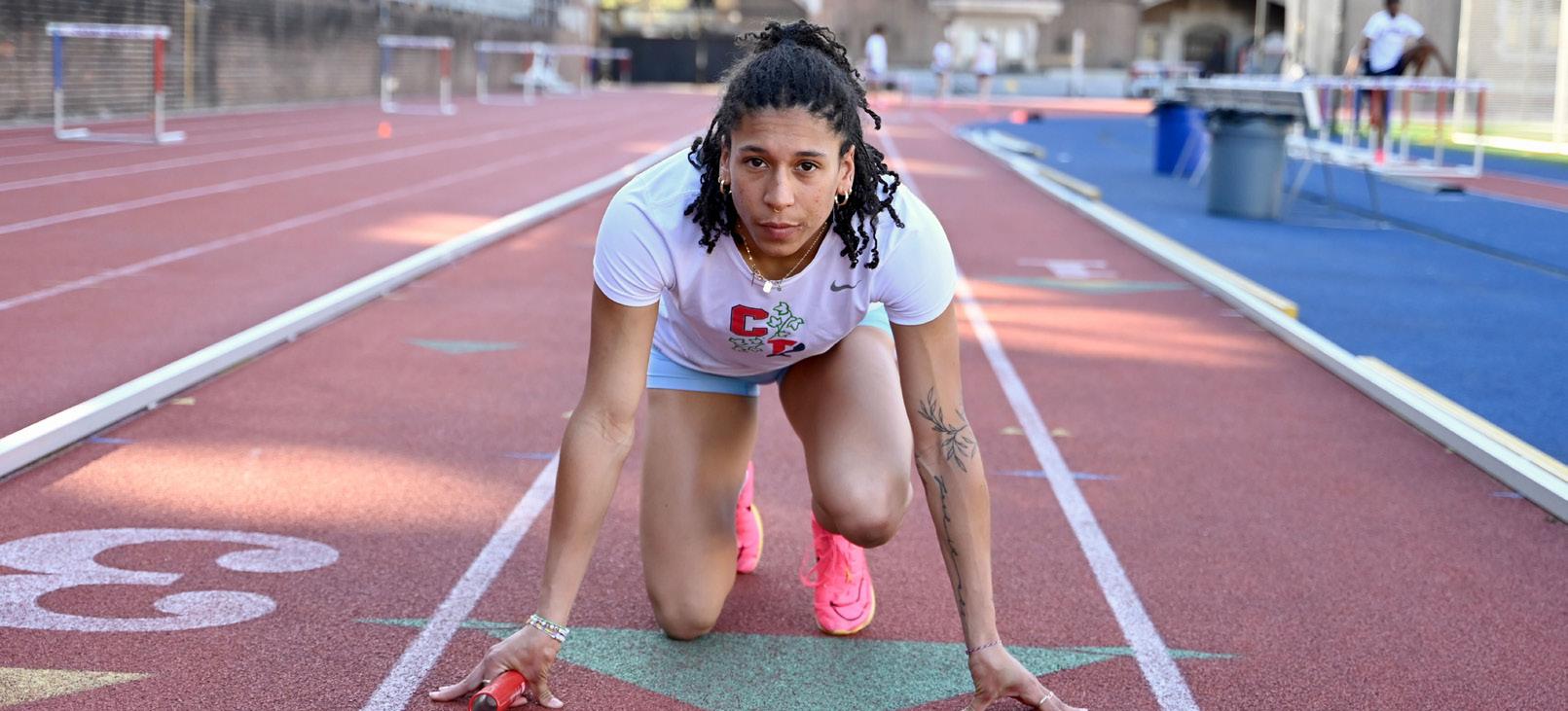
Women’s Rookie of the Year: Mataya Gayle
Gayle took home both Ivy League and Big Five Rookie of the Year
SEAN MCKEOWN Deputy Sports Editor
In a rookie season for the books, Mataya Gayle proved herself to be the future of the Red and Blue women’s basketball. Walking in with the pressure of filling the shoes of Kayla Padilla, one of Penn’s all-time greats, the Woodstock, Ga. native started all 28 games for Penn, in a freshman season where she earned Ivy League Rookie of the Year and Big Five Rookie of the Year. Ranking third on the team in scoring, first in assists, and first in steals by the end of the season, Gayle exceeded all expectations. Coming out of the gate hot, Gayle scored 25 points in only her third game as a Quaker and ended the season with five scoring performances of 20 or more. Additionally, she racked up seven Ivy Rookie of the Week awards and a USBWA National Rookie of the Week award, with the latter earned for notching 28 points in a win over a Maine
team that would go on to win the America East championship.
Gayle’s electric play was a primary reason Penn made it to the Ivy League Tournament as the fourth seed and earned a trip to Columbia to fight for an Ivy League title. It was on this stage where Gayle had arguably her greatest performance. In her first collegiate playoff game, a bout that saw Penn and Princeton lock into a tight back-andforth, Gayle led all players in scoring (20) and assists (five). While her performance wasn’t able to help the Red and Blue push past their perennial Ivy foil, the Tigers, it was enough to earn her an All-Tournament bid. Despite the season not ending as many had hoped, Penn has plenty to look forward to with Gayle running the point.
Coach of the Year: Andy Ma
In his 15th year at the helm of the Penn fencing program, Ma continues his streak of success
VIVIAN YAO Sports Editor
Prior to the 2023-24 season, the last time a Quaker took home a national title in an individual foil event at the NCAA Fencing Championship was 27 years ago. Similarly, the last time Penn women’s fencing won the Ivy League was two decades ago.
This year, under Penn fencing coach Andy Ma’s leadership, Penn men’s fencing finished one and two at the NCAA Fencing Championships. In the individual men’s foil finals, senior foil Bryce Louie was able to eke out a win against teammate and senior foil Blake Broszus to become a national champion.
Equally notably, Penn women’s fencing secured the program’s first Ivy League title since 2004. In all, six
tournament, with two additional Quakers earning All-Academic honors. For the success at the tournament, Ma was recognized as the Ivy League Women’s Fencing Coach of the Year — the fifth of his career and second as the women’s coach. Ma led the women’s team
Those types of nights were few and far between for a Quaker team that finished this season 11-18, including a dismal — albeit injury-ridden — 3-11 Ivy League run.
Villanova, meanwhile, amassed an 18-16 record and missed the NCAA Tournament for just the third time in the past 20 seasons. And again, just to reemphasize, the Wildcats finished in sixth place in the Big 5.
“I told these guys to come here and this is what they dreamed of,” Penn coach Steve Donahue said postgame. “Then to walk out and perform and have the campus basically running onto the court, it’s why you play college basketball.” The star for Penn against ‘Nova was, ironically enough, freshman guard Tyler Perkins, who will be on the other end of the court when those two teams meet next season. Perkins announced his transfer to Villanova in March after just one season in the Red and Blue. Against his new team, Perkins chipped in 22 points and six rebounds in what was just his fourth collegiate game. As a team, Penn shot 51.1% from the field, 41.2% from three, and out-rebounded the Wildcats 38-35.
Heartbreak of the Year: Top-
seeded men’s soccer loses to
Brown
by penalties in semifinal
The Quakers entered the Ivy League tournament as top seed and the favorites to repeat as champions
CALEB CRAIN Former Sports Editor
In 2022, Penn men’s soccer won the Ivy League title and advanced to the NCAA Tournament. There, the Quakers nearly beat Syracuse as the latter made a run to the national championship game. This year, after winning the regular season title and earning the right to host the inaugural Ivy League Tournament, expectations were similarly high for Penn.
But what greeted them was another close loss, but this one felt more heartbreaking than anything. After being tied 2-2 with Brown following overtime, Penn was downed on penalty kicks after the Bears converted three of their chances to just the Quakers’ two.
The game just before it had lived up to high expectations. On one of the first truly chilly nights of the fall and under the bright lights of Penn Park, two skilled teams
played out an incredibly tight game. The match was scoreless until the 71st minute, when junior midfielder Leo Burney scored the first goal. But the Bears equalized, sending the game to overtime, where they quickly took a lead. Even getting to penalty kicks took a miracle, as Penn scored and then saved a penalty try by Brown in the game’s final ten minutes. In penalties, a team game becomes a series of individual contests — a test of fate between goalkeeper and striker. Tragically for the Quakers, Brown won one more of these contests than they did. After the game, the Penn players made their way to the stands, greeting the family and friends who’d spent their Friday evening there, each wishing that the embrace could have been under better circumstances.
8 THURSDAY, MAY 2, 2024 | THEDP.COM THE DAILY PENNSYLVANIAN SPORTS Puzzle
T R I M F C S F A R M E D W A C O L A H A R I A N A O N E O N O N E B E D L A M A D D E R A L L S E A M S S W A L L O W W E E E N D S L S T H E P I L L R O O F A T O N E A N T I D E P R E S S A N T S L O G I C K E E P F O R E I G N I R A W A Y A R E S U C C E S S C A S T S P R O A C T I V I N T U I T A N C H O R E D A G E N D A B I T L A N E L E D G E R S C S E N T S
of the
Fallon
junior breaststroker is poised to take the pool at the U.S. Olympic Trials later this year VALERI GUEVARRA Sports Reporter
Answers
Men’s Athlete
Year: Matt
The
senior track and eld sprinter will be running at the U.S.
Quakers
men’s
this year’s
League
to a 23-7 record in a season that saw the team ranked as high as sixth in the nation. The Ivy title was the first of his career as a women’s coach. Ma has also received Ivy League Coach of the Year honors three times as the men’s fencing coach and has amassed over 500 wins coaching both teams throughout his career.
across the
and women’s teams received All-Ivy honors at
Ivy
ANNA VAZHAEPARAMBIL | SENIOR PHOTOGRAPHER
WEINING DING | SENIOR PHOTOGRAPHER
school spirit as it rose to the top this season and dominated across the board. In the 2022-23 season, the men’s squash team fell short of expectations, leaving a chance at redemption in the hands of the 2023-24 team.
This team consisted of a group of standout players, including senior Nick Spizzirri, junior Nathan Kueh, junior Roger Baddour, sophomore Omar Hafez, and freshman Salman Khalil, who provided hope for Penn men’s squash fans that this season would not be a repeat of the last. The team collected win after win and successfully secured a share of the Ivy League title in a notable win against Yale. Here Khalil and Spizzirri

led the team with standout straight-set victories.
The team didn’t stop there. In the Potter Cup, Penn successfully executed a revenge tour, defeating Princeton and Trinity, each of which had defeated the Quakers during the regular season and the latter of which had beaten Penn in the 2023 Potter Cup. The victory that followed brought Penn its first-ever collegiate squash national team championship. This team came into the season prepared to repudiate the shortcoming of the season prior, and they did so with determination and pride.
“It felt like we had built up those scars and calluses,” coach Gilly Lane said. “You learn more from losing, and we have lost in big moments. There was something about this weekend where the guys just said there was no chance [that] we were losing. And they did it.”
Entering the 2024 NCAA Fencing Championships, Penn fencing had not taken home an individual title in the men’s foil in 27 years. This year’s final was different; that was guaranteed to change. Quaker seniors Bryce Louie and Blake Broszus each won their semifinal matchup, setting up a title bout that guaranteed a trophy would be coming to Philadelphia.
In reaching this moment, the pair first had to reach the four-team playoff round. Louie dominated, winning 19 of 23 preliminary bouts and earning the top seed, while Broszus took second with 16 wins. Both faced Ivy League rivals in their respective semifinal matchups, as Louie took on Daniel Zhang of Harvard while Broszus matched up against Sam Kumbla of Columbia.
Broszus, who entered the semifinal match on a fourmatch winning streak, handily defeated Kumbla 15-8, rolling into the finals. Louie also rode a four-match streak
into his playoff bout, facing Zhang, who also had a hot foil entering the match. In a back-and-forth battle, Louie finally put Zhang away with a score of 15-11, setting up a final with both sides representing the Red and Blue. The Quaker contingent in men’s foil guaranteed the first title for Penn since 1997; the question now was who would take it home. Louie, the clear favorite based on his previous performances, looked to end his Penn career on the highest of notes, while Broszus aimed to do the same as the
It’s 7 p.m. on the first day of the 128th Penn Relays Carnival. The air is chilly, spectators are shivering, and after a morning packed with high school events, the college distance runners are finally stepping onto the track. While distance races might not be quite as stimulating for the spectators as the sprints, the upcoming race is sure to stop everyone in their tracks.
In her last year competing at the Penn Relays as a Quaker, senior distance runner Olivia Morganti recorded a show-stopping performance, earning her the DP Sports Moment of the Year Award.
Last Thursday, Morganti competed against 31 athletes in the 3000-meter steeplechase. The race didn’t appear to be anything special until the second half, when Morganti and two other competitors pulled ahead from the rest of the pack. They maintained their lead and positioning
until the last two laps, when Morganti sidled up to Penn State distance runner Makenna Krebs to battle for first place. The tension in Franklin Field continued to climb as Morganti finally pulled into the lead with 600 meters to go. From there, Morganti widened the gap with each stride, and the stadium went wild as she became the first female athlete to win an individual track event for the Quakers at the Penn Relays.
“Conservative early and aggressive late,” Morganti said of her strategy going into the race. “A little bit less than 800 meters to go … I knew I could run fast[er] and I just had to trust myself.”
Her final time, 9:57.94, set a new program record for Penn, a record previously held by herself, and moved Morganti up to 12th place in the NCAA rankings. Morganti has one more year of eligibility, which she plans to use at the University of Colorado at Boulder next year.
Entering the 2023-24 season, no Penn track and field pole vaulter had ever managed to successfully clear a height of 18 feet.
This season has seen not one but two Quakers pole vaulters surpass this mark: senior Scott Toney and junior James Rhoads. Toney was the first to do so, breaking the Penn program record with a height of 18 feet and 0.5 inches at the Penn State National Open. Not to be outdone by his teammate, Rhoads followed suit two weeks later by resetting the record at 18 feet and 3.75 inches at the 2024 Darius Dixon Memorial Invitational.
Since then, Rhoads has pushed the program record even higher, reaching a height of 18 feet and 5.25 inches at the 64th Annual Mt. SAC Relays. The mark places Rhoads in a position to potentially qualify for the United States Olympic Track & Field trials, set to take place from June 21-30 at Hayward Field in Eugene, Ore.
At the Ivy League Indoor Heptagonal Championships earlier this year, both Toney and Rhoads topped out at 5.36 meters, with Toney claiming the Ivy League title due to using fewer attempts and Rhoads finishing in second. At the NCAA Division I Track and Field Indoor Championships a few weeks later, the two’s fates were reversed as both successfully cleared 5.50 meters — this time, Rhoads succeeded using fewer attempts to finish in fourth while Toney took home fifth. Rhoads and Toney also finished first and second at the 128th Penn Relay Carnival, where Rhoads became just the 12th Quakers pole vaulter to win a Penn Relays title and the first since John Gray in 1958. With the Ivy League Outdoor Heptagonal Championships and the NCAA Division I Track and Field Outdoor Championships on the horizon, this dynamic duo still has plenty left in store.























































9 THURSDAY, MAY 2, 2024 THEDP.COM | THE DAILY PENNSYLVANIAN SPORTS STUDYING LATE? WE’RE OPEN LATE! Domino sTM 215-662-1400 4438 Chestnut St. 215-557-0940 401 N. 21st St. WE MAKE ORDERING EASY! CALL DIRECT OR CHOOSE YOUR ONLINE OR MOBILE DEVICE RECEIVE a FREE! 8 Pcs of Bread Twist (3 options) Use Coupon Code [8149] | Minimum $15 Purchase - Delivery Only WHEN YOU ORDER ONLINE SUN-THURS: 10AM - 2AM • FRI & SAT 10AM - 3AM Performance of the Year: Bryce Louie and Blake Broszus at NCAA Fencing Championships The Penn men’s fencing duo take home the honor after nishing one and two at the NCAA tournament LUCAS MILGRIM Deputy Sports Editor Moment of the Year: Liv Morganti secures program’s first individual female track title at the Penn Relays The senior steeplechase specialist wrote herself into Penn track and eld history PHOEBE WEINTRAUB Sports Associate Team of the Year: Men’s squash The team brought home the program’s rst ever national championship LUCY RUPERTUS Sports Reporter Dynamic Duo of the Year: James Rhoads and Scott Toney The Penn men’s track and eld pole vaulting duo have consistently dominated every competition this year VIVIAN YAO Sports Editor This year’s team of the year is undoubtedly men’s squash. Despite being a more obscure sport, squash has been able to garner significant
underdog. Broszus proved to be overmatched by his teammate in the championship bout, as Louie took home the title in a 15-9 victory, making history for the Quakers. Both Louie and Broszus provided Penn with one of its best performances in fencing in school history and the best performance for the Red and Blue this year.
PHOTO COURTESY OF PENN ATHLETICS
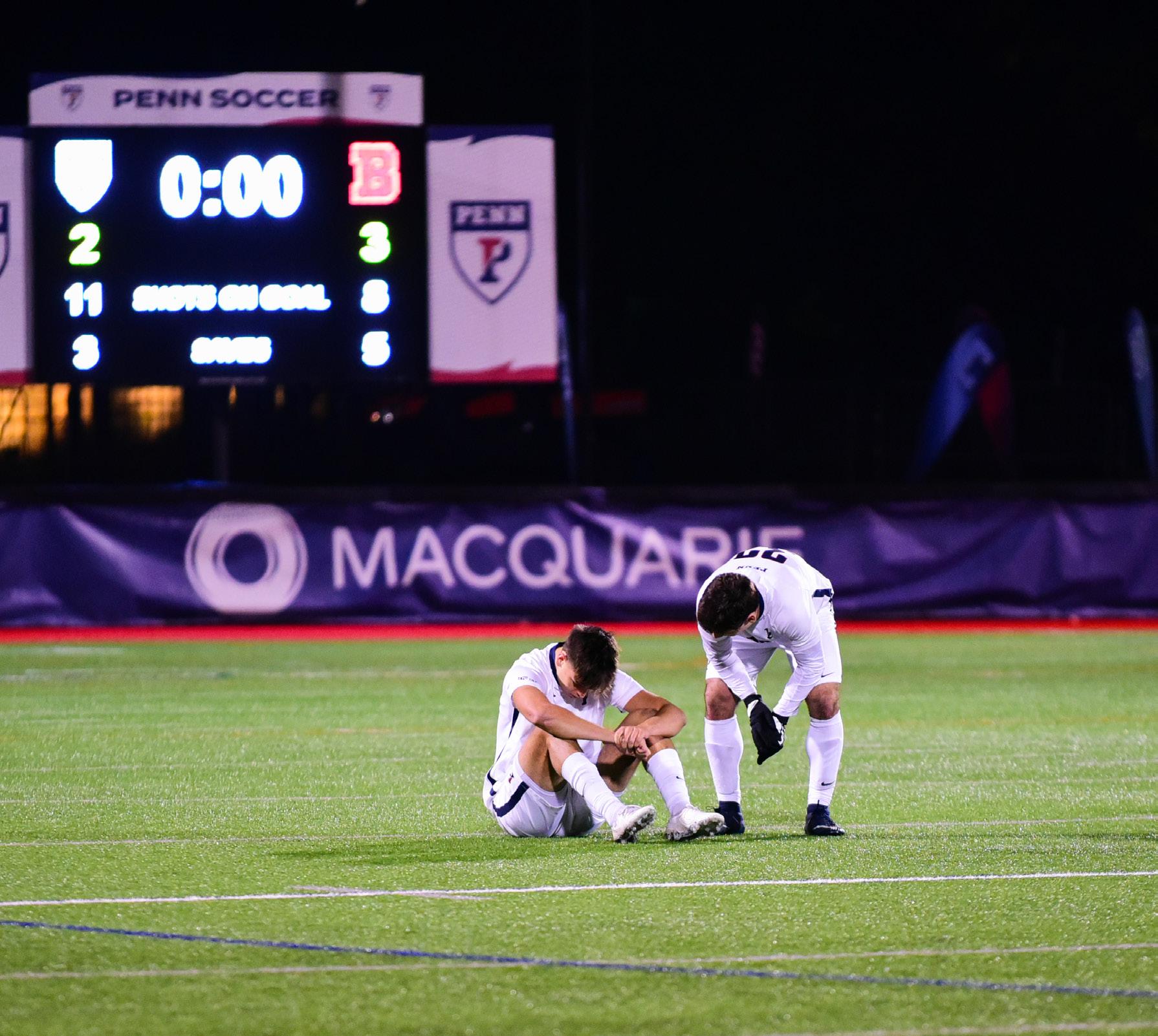
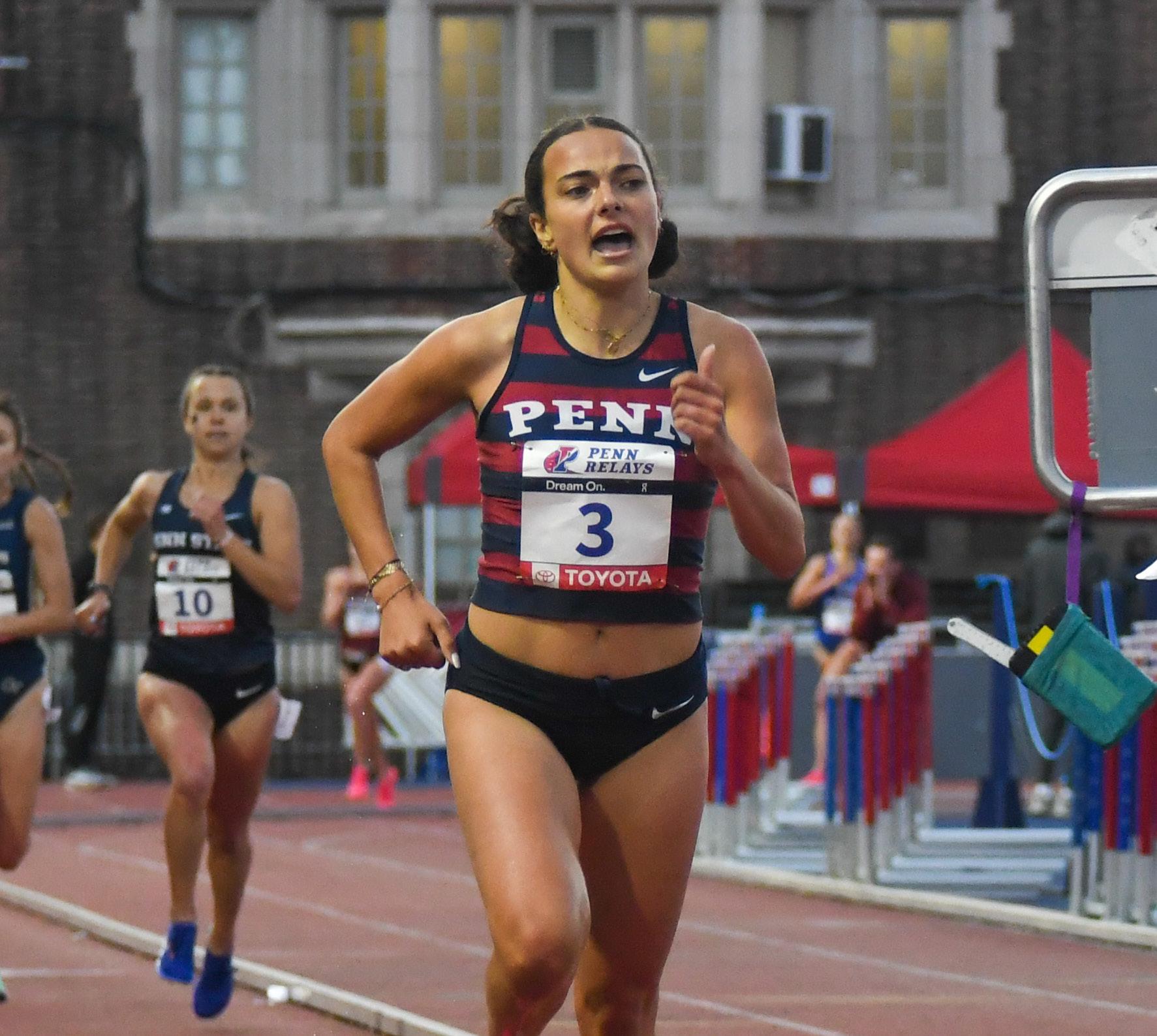
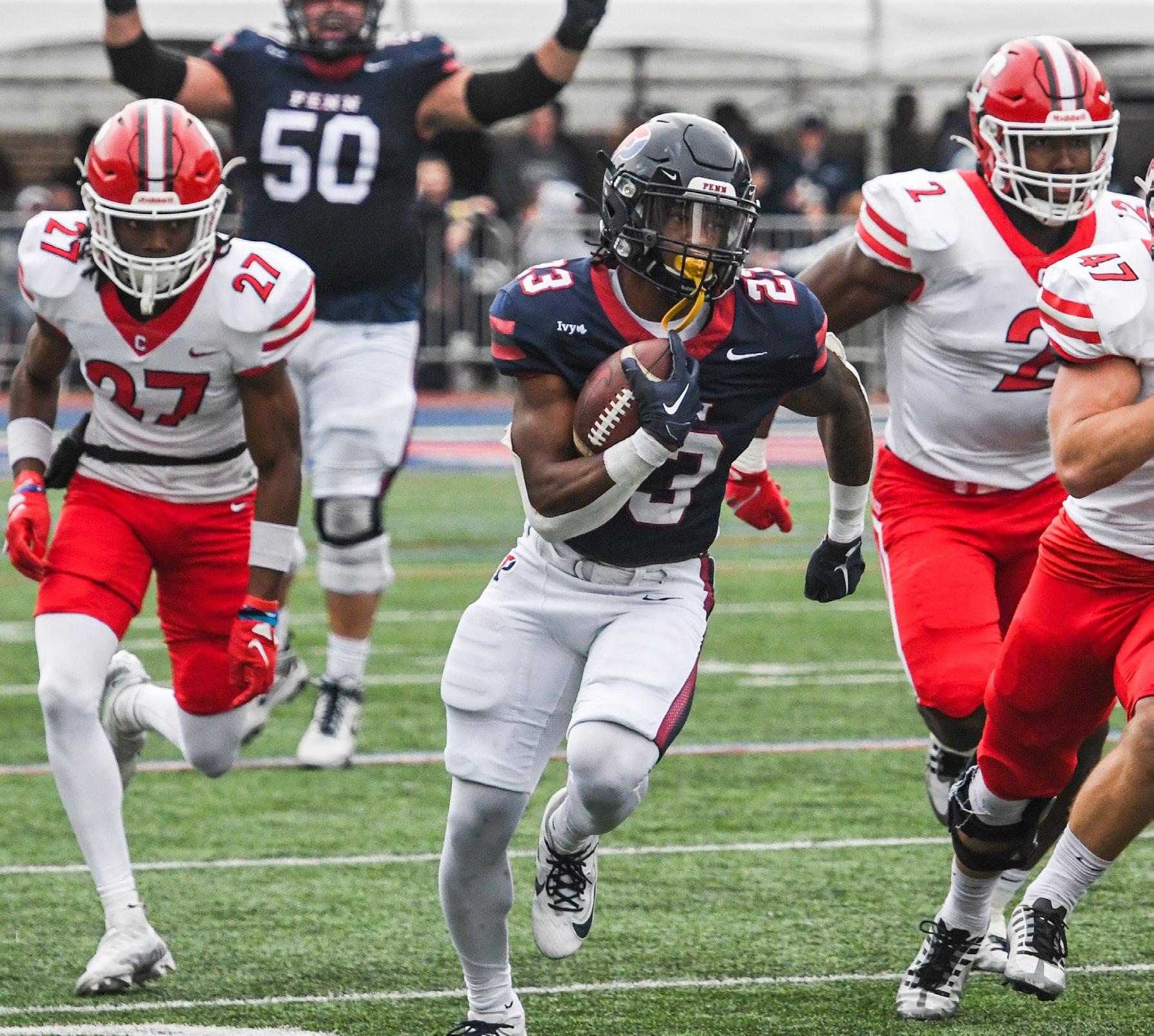

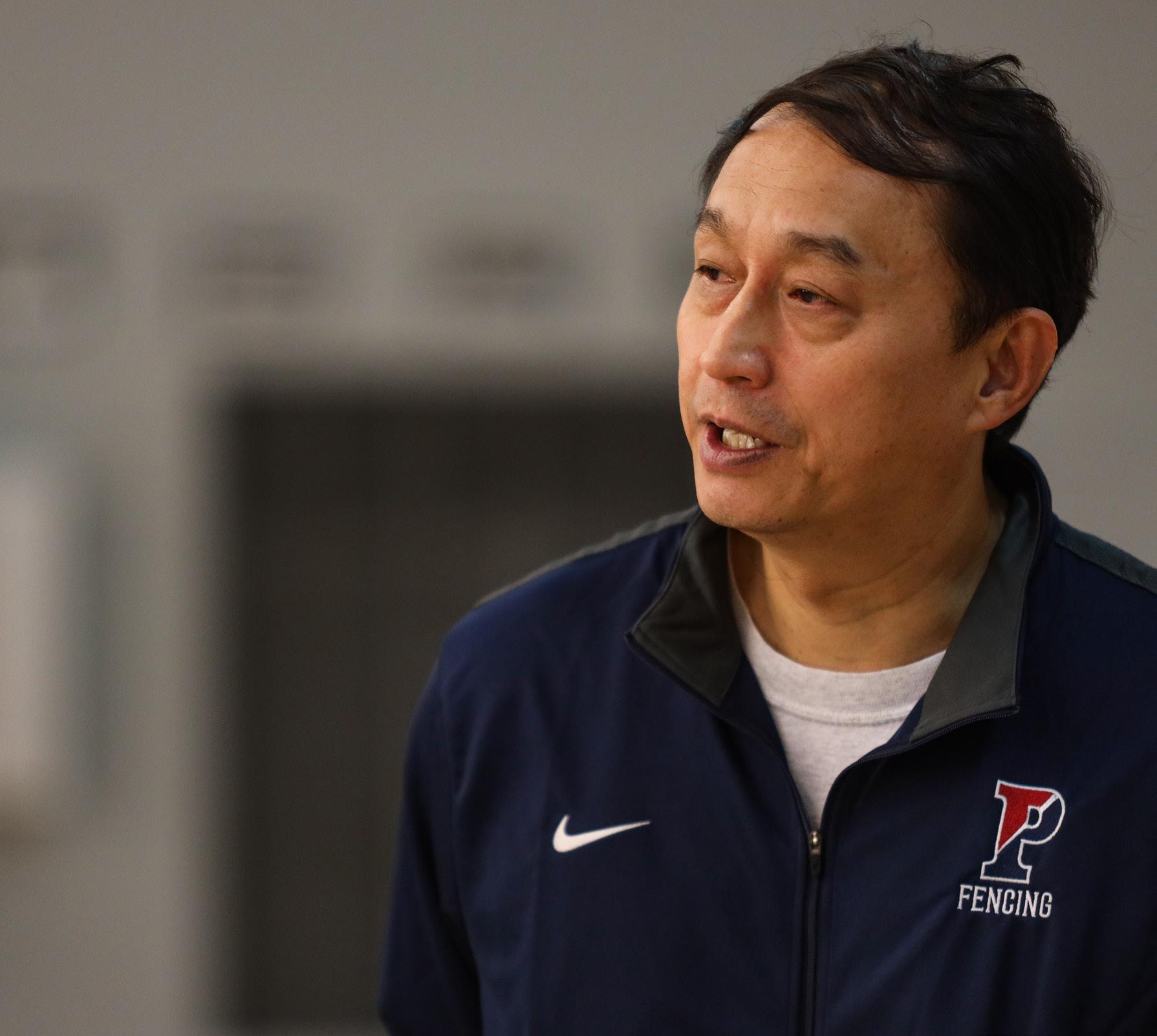
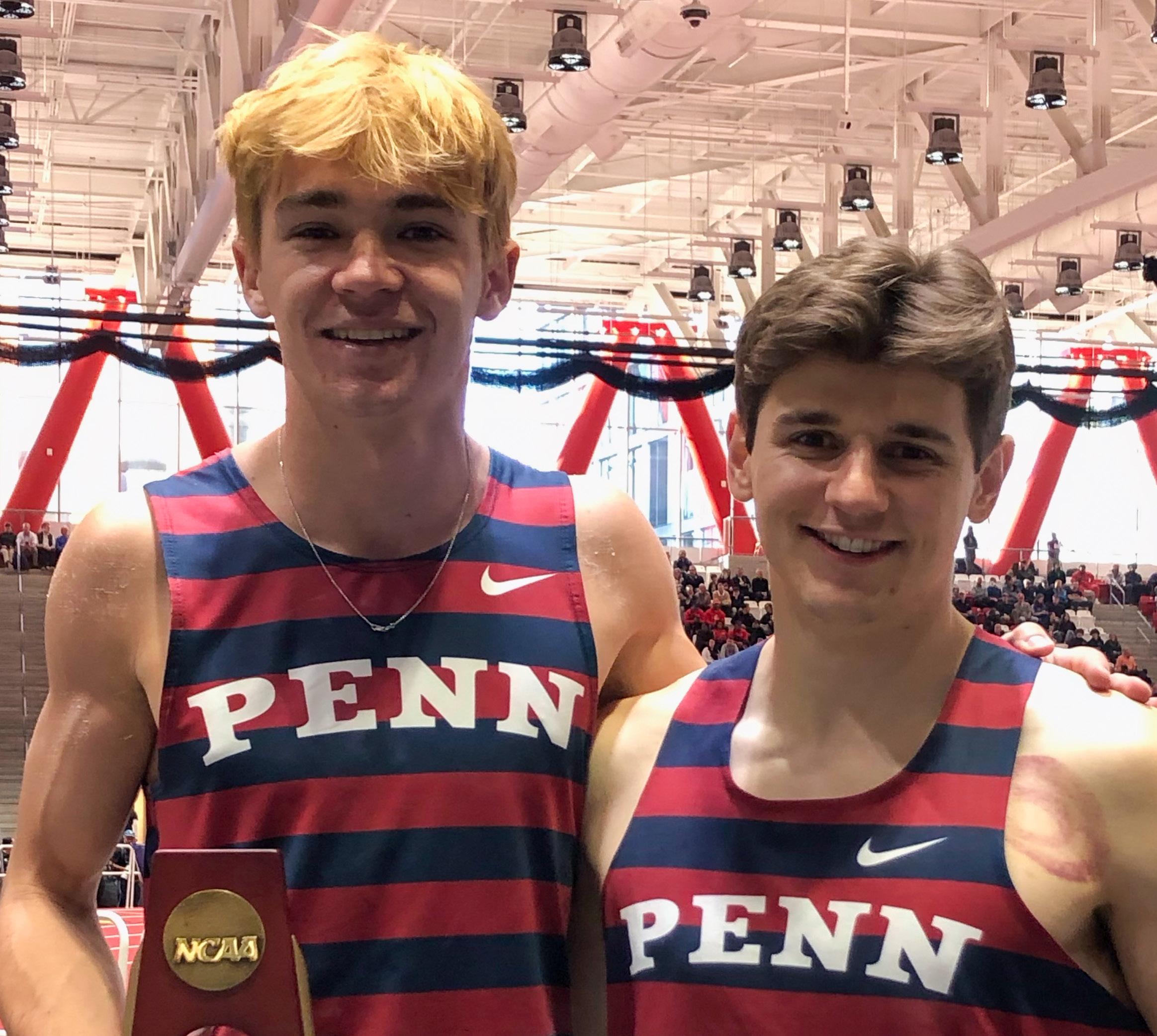
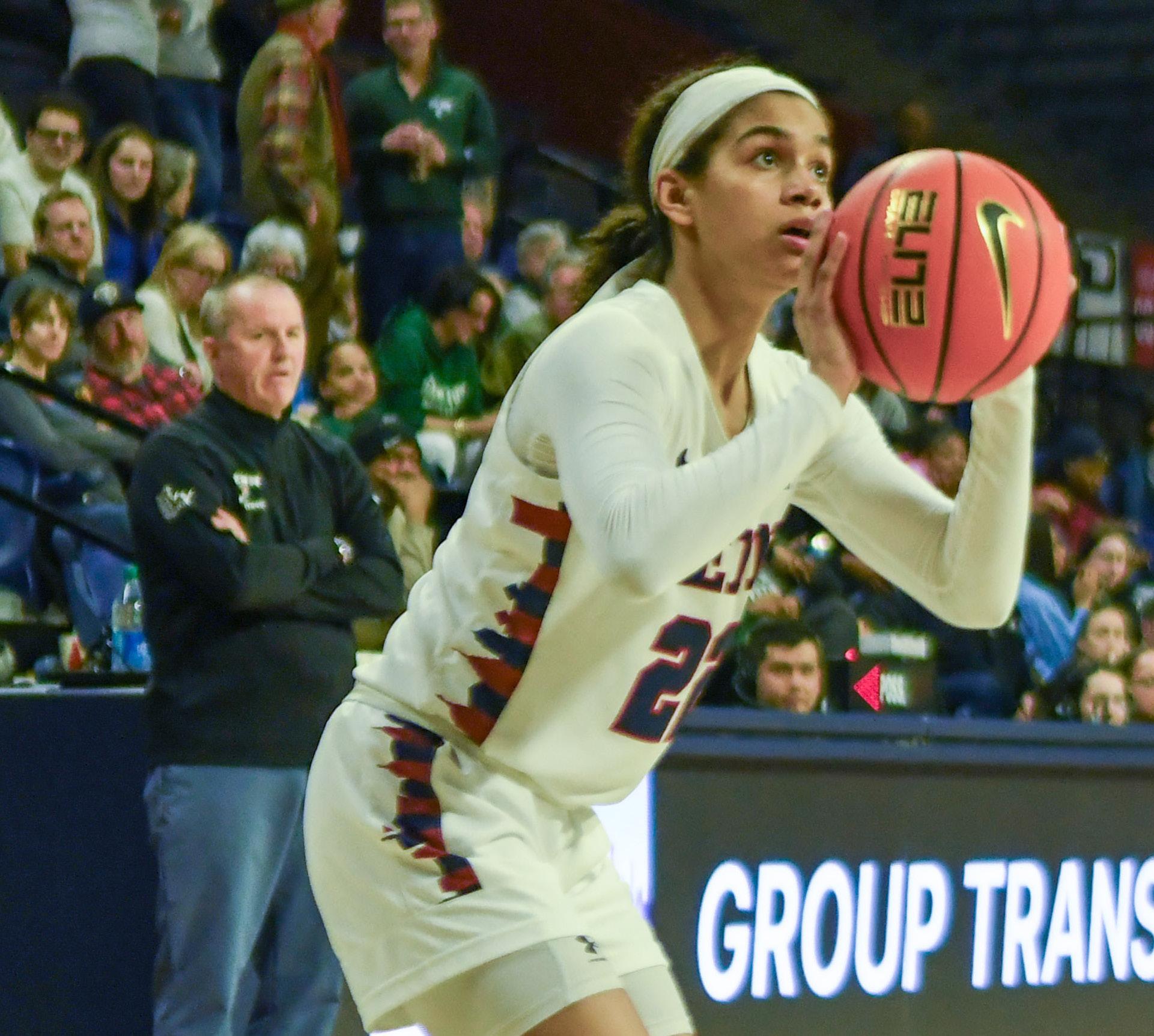
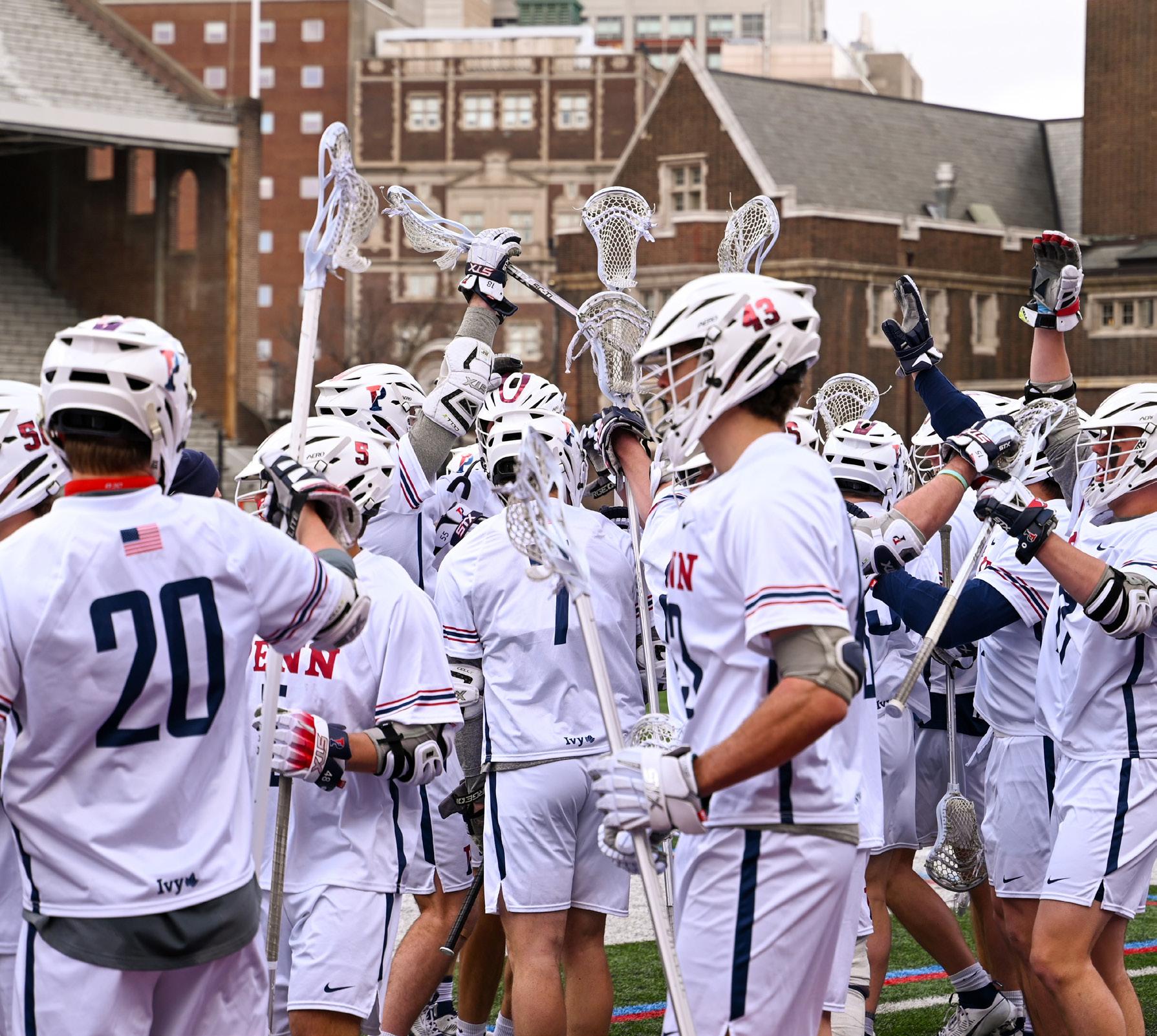
THE INDEPENDENT STUDENT NEWSPAPER OF THE UNIVERSITY OF PENNSYLVANIA • FOUNDED 1885 PHILADELPHIA, THURSDAY, MAY 2, 2024 VOL. CXL NO. 14 SPORTS Men’s Athlete of the Year Women’s Rookie of the Year Moment of the Year 8 8 9 CONTACT US: 215-422-4640 SEND STORY IDEAS TO DPSPORTS@THEDP.COM ONLINE AT THEDP.COM BEST OF 2023 2024
